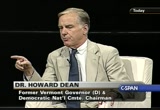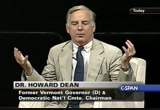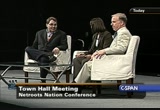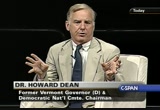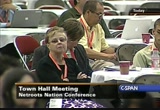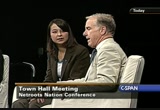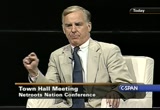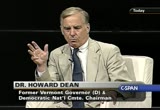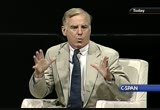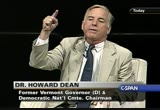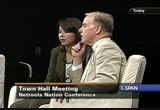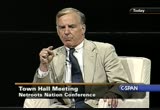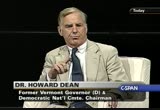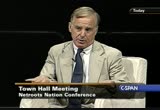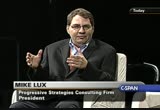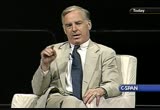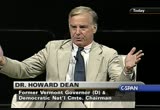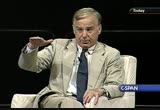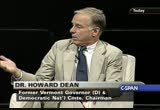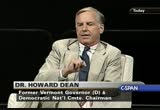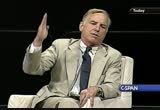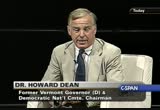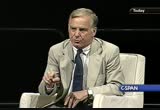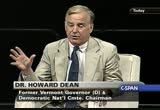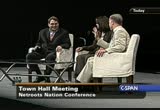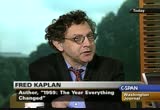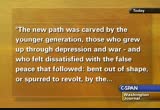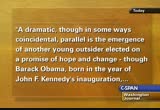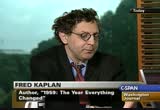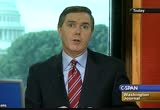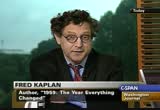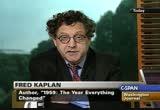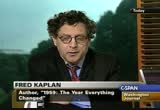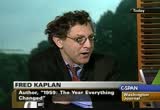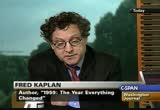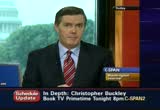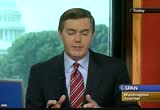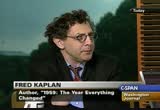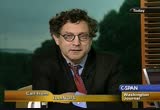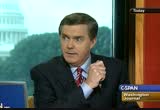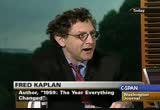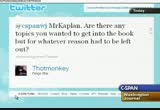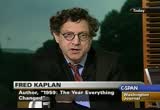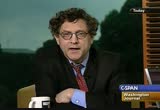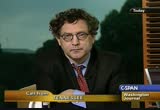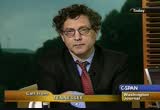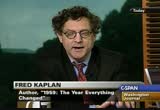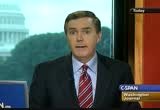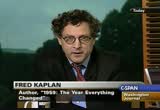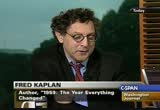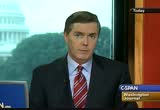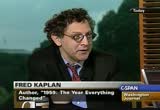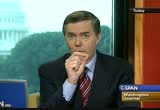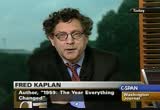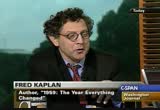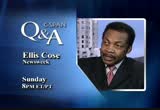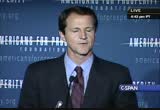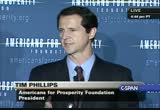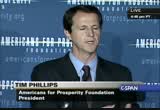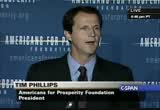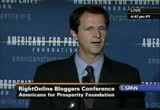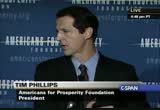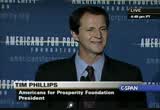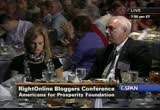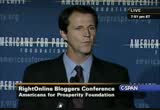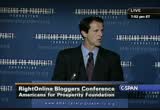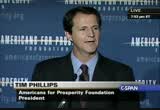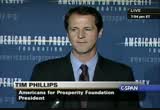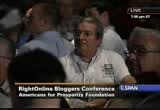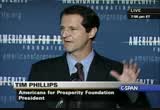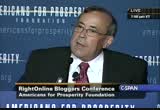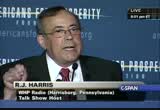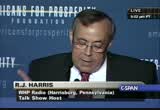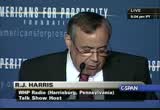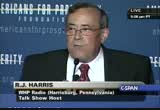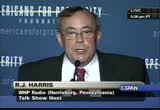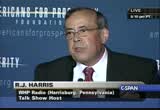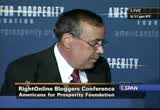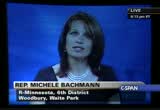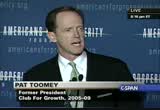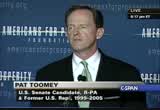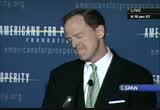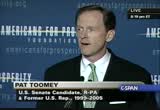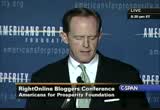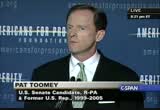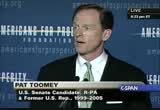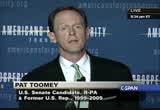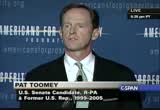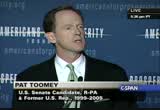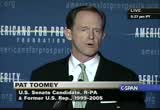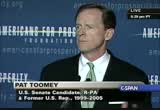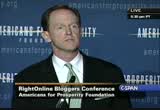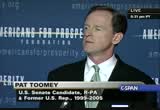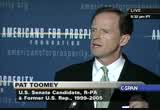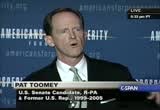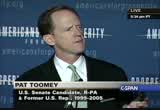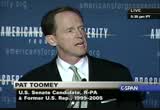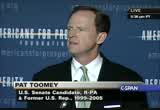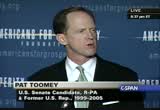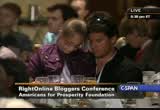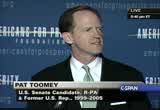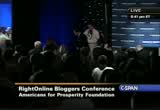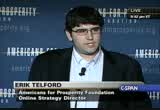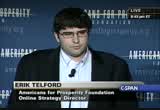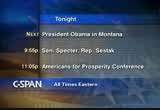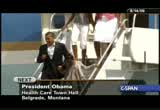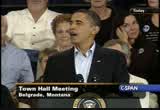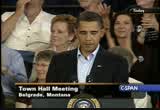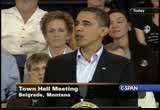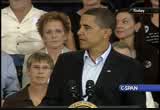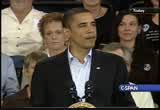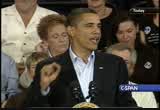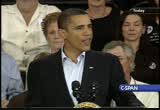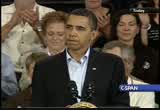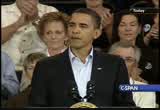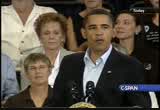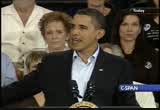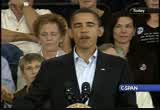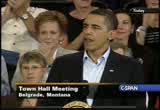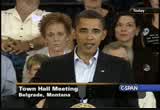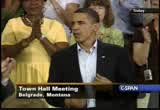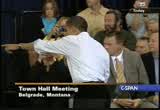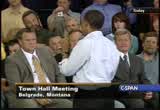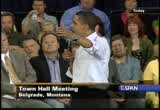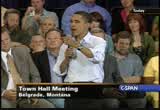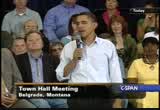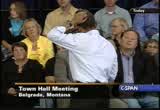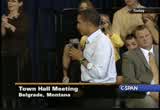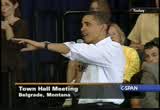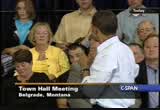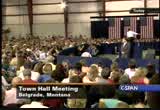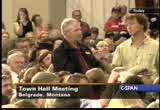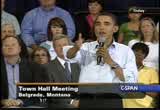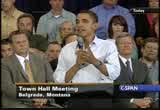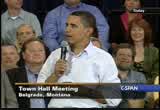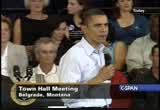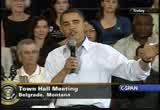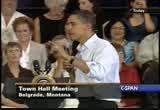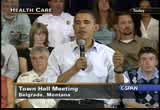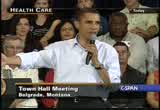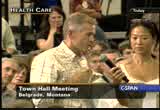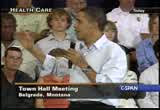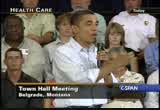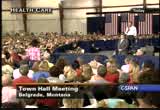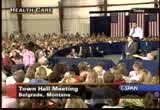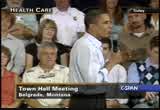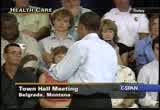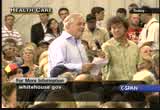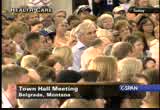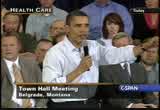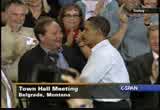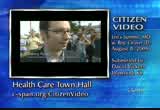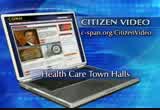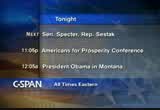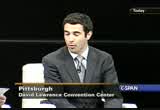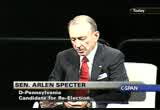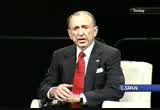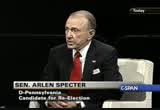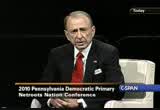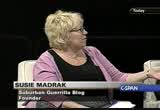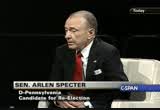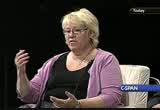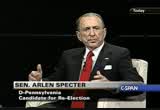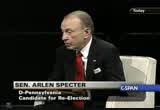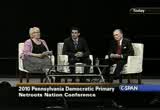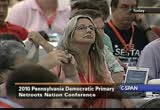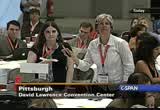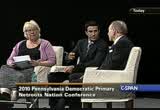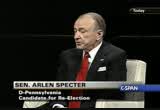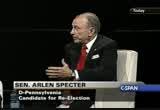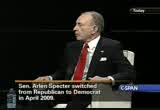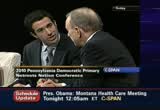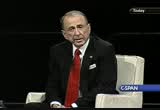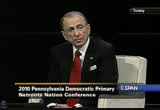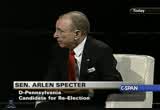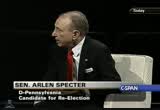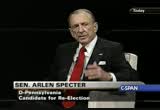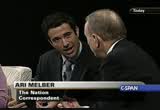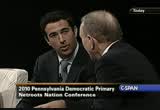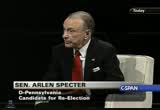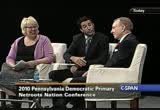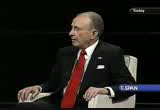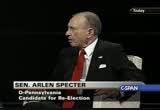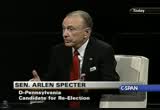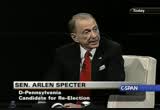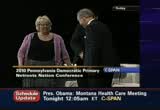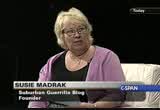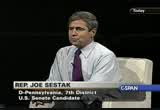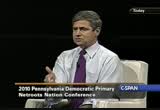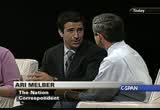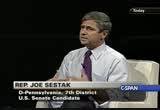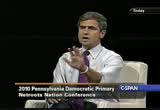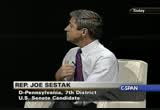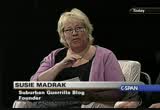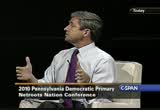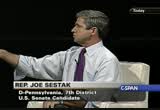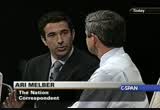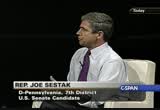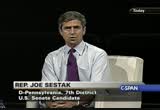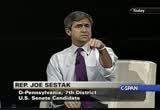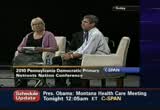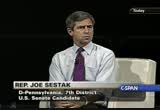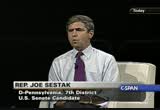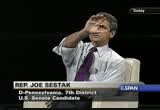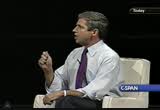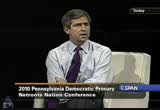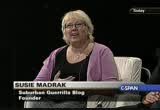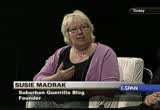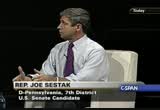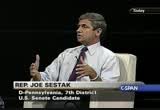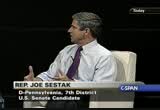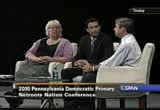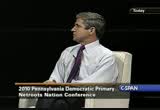tv Tonight From Washington CSPAN August 14, 2009 6:30pm-11:00pm EDT
6:30 pm
positive contributions of the private sector. one is the pharmaceutical company, they make some extraordinary advances that makes a big difference in people's lives. also the big corporations that have self insured programs do make a real effort to switch the model from the sickness to well wellness. the public auction should be the largest insurance and the most likely to be able to change behavior over a wide scale. >> i have a question from the audience. he asks whether you think that president obama should focus so much on bipartisanship on health care when no republicans are going to vote for the legislation anyway. >> i think he is doing the right thing as long as he understands
6:31 pm
that no republicans will vote for this. here -- [applause] >> -- but the fact of the matter is he needs to let the republicans people for themselves. i think what he's doing is exactly the right thing. look, the generation that elected him, which would really like to see cooperation. he knows they're not going to get any, but as long as he allows the american people to see the republicans for what they're really advertising, which is no way, no how, jim dement spoke perfectly for the republican party, we're not cooperate willing, because we want to kill health care reform so we can get obama. i don't think the american people are going to buy that i think the american people do want bipartisanship. i think it would be a bad idea for the president of the united states to say we don't want bipartisanship. the republicans are getting closer every day and chuck grassley in fact said that and he was one of the few who talked about it.
6:32 pm
i think this tactic of allowing the republicans to eventually show their true colors to the american people, it requires a lot of patience and i think it's very smart, but as long as nobody thinks that bipartisanship is more important than having a good bill, because having a bipartisan bill that doesn't do anything is much worse and much more expensive than having a good bill, even if we don't get a single republican vote. [applause] >> i want to ask you about co-ops, you're from a rural stays, there's some centers saying we should try the co-op option before we have go to a public option. there have people who have pointed out the problems with that. rural electric co-ops never get enough market share to compete with bigger electric utility
6:33 pm
companies. what's your reaction on the coops and do you think there's any ground there for, you know, middle ground or whatever? >> first of all, the author of the co-ops is a guy named kent conrad, who is one of my favorite people in the senate. i like him a lot but he's absolutely wrong about this. this is a political crow mice, not a policy compromise and it will not work. now, let me just -- i was o a panel with doug, who was its omb manager for president bush, i think he was -- he was an economic adviser for senator mccain. he does what he's talking about. he's on president bush's council of economic policies. he's very conservative. he thinks the co-ops are a waste. here's why. first of all, they're too small to do their good. second of all, we've already tried this in this country. blue cross-blue shield used to
6:34 pm
be a non-profit, public company with members running on the board and they got eaten up and killed and crushed by the private insurance industry. most blue crosses today are in an anthem or something like that, which bailiffs exactly like all the other insurance companies. they stick it to you if you get sick, they won't have you if you look sick, they're not really insurance companies anymore. i don't think we want to help anything that does -- that makes it easier for the insurance industry is probably in this bill, is probably not taking us in the direction we want to go. we want the insurance companies to serve us better and not put more money into what they already do. and the long -- in the long range, the co-ops will fail because they'll be too small and they'll get -- the insurance company is going to use their deep pockets to undercut them and force them to practice at a loss. and eventually they will crush them just like they crushed blue cross and there will be no public co-ops. the public co-ops are a
6:35 pm
political compromise to get this bill out of the committee and they will not work. >> hey, mel, could we get the next question from the audience please? and while we're doing that, jill from ohio, she's actually here, a blogger, asked me to ask you, governor dean, how do we keep mental health parity in the discussion, because health care is very broad, but that often gets left by the wayside. [applause] >> and also i have to say, jill millemiller writes like she talks.com. >> it's a great issue that's very close to me. when i was a freshman legislator in 1983, i introduced a bill for mental health parity in vermont. 14 years later, as governor, i signed the bill. that's how long it took us to get this done, in a relatively
6:36 pm
progressive state. so it is a real problem. we have a mental health parity bill in this country, it was passed in honor of pete demencchi. as with abortion, this issue will ultimately, i hope, be settled by this panel of people who are going to make up the benefits. at minimum, they will have to obey the law and the law says, that insurance has to include meant at health benefits. the question is, the nitty gritty is how many limits and what are they allowed to do in order to limit the benefits? and my own view is as we get closer and closer to understanding the brain, and understanding that it is an incredibly complex organ, but it is an organ and functions like every other organ and therefore, can -- these are real illnesses i mean, most mental illness,
6:37 pm
even though it has names, are syndromes, not illnesses. we don't fully understand what causes the problems, and. pharmaceutical approach is while incredibly successful and they've allowed us to basically move people out of institutions where they were in the 1950's, are mostly hit or miss. we try something, it seems to work, we're not sure what the mechanism is, but it does work and if it doesn't have too many side effects, we let people use it. we're moving closer and closer to a real medical model of mental illness and the closer we move, the less reason there is, at all, if there ever was a reason, to treat mental health differently. so my view onto is the brain is an organ, ought to be treated like every other organ and there ought not to be limits on mental health treatment as a part of the people's insurance program and you can manage, you can manage that and you can have quality assurance like you do in everything else and make it work, so i think -- i'm hoping that the panel that does the
6:38 pm
benefits panel will go beyond demencchi and have true mental health parity. >> we have a twitter question from everyday citizen. what are the points to stress about the public option, how do we clearly blog about it, how do we talk about it, how do we keep the message simple on it? >> i'm glad that you asked it. i answered this question once and i'll do it twice and we'll probably do it three ar four more times. it's the most important thing i'll say all day. when we frame this debate, it is not about death panels and social highed medicine. i don't think we want to spend all our timeefuting this, because the people who believe this won't list tone what we say anyway. the debate is really clear. it's about two things. the first is, are we going to allow the american people to choose for themselves, this is not a debate about whether the single payer is better than the public option or better than the private health insurance system. are we going to give the american people a full range of
6:39 pm
choice. do they deserve that or shall we do that ourselves, us politicians, bureaucrats and insurance companies? that's the first piece. the american people get to choose or the people in washington will choose for you. that's the first part. the second part is related. whose side are you on? the american people have spoken. they want the choice. are you with the insurance companies who want your money, or are you with the people who pay your salary and sent you there. because if you're not with the people who pay your samry, what happens to you may be what happens to most employers -- employees who don't support their employer. [applause] >> we have another question from the awe queens. -- audience. january is -- asks, do you have any concerns that if this bill passes that the public option will appear less cost effective
6:40 pm
because it will attract people who are high risk and with greater medical needs? you know, i have heard this too from our members, and the way that i approach it, and i need you to, doctor, prove it, if i can say this, that i ask them, do think tithe their place of worship and if they do, this is very similar, if we all pitch in and we all have to pitch in, that it's going to lower the cost for everyone, but i think that that does come up quite a bit, if we all are part of this public option, is it just going to bring if people that are high risk, and is it not going to cost less? >> this is a very interesting question. my first response is, no, it won't just bring in high risk people. because in the legislation is guaranteed issued and community rating. that is, you will no learning be able to be turned down, so if you should choose the private option, they have to let you in. however, there will be some
6:41 pm
increased risk because a -- now, look. there have been groups that work for health insurance companies that say 110ful people are going to sign up for the public. the cbo, they're the only non-partisan group i know of, believe that that 5 or 10 million people will initially sign up for the public option. but whatever of the number is, and i don't believe it's anything close to what the lewen group thinks it is, there are a higher -- disproportionately a higher percentage of people in the uninsured pool that are higher risk. it's not screaming difference, but it is a difference, because one of the reasons some people can't get insurance is because they are higher risk and the insurance companies won't give them insurance. and because they're probably poorer and poorer people have higher risk, so the uninsured pool, which may be more likely to sign up for the public option, may have a slightly
6:42 pm
higher risk. and so -- but i think it's not going to make the public option look bad, because the public option is so much better at controlling costs, it will still be cheaper. remember, its overhead rate for medicare is 4%. the overhead rate for a good blue cross, non-profit, there aren't many left, but let's say non-blue cross, non-blue profit is 12% and the overhead for an insurance is 20%. and that means that medicare already has a 16% advantage over private market without doing anything different, so there's a lot of room there for increased risk, and then the last thing i would say is exactly the point that you made. so what? these people are getting health care anyway. it's bad health care because they go to emergency rooms and they don't go and see the doctor with they need to and it ends up being expensive, etc., etc. we're paying for it anyway. if you have private insurance, your teachers are paying for it and they have private insurance. if you're in a big municipal county or the city of new york
6:43 pm
or chicago or almost a., and you have any kind of a public hospital system, you're paying for it. if you're in a state -- or a place with no public hospital system, you're still paying for it, because your state is it paying some hospitals uncompensated compare. we're paying these people anyway. so at the end of the day, with risk adjustments, it doesn't make a difference if the -- that money so already in the system and you're not going to pay more because of it, in fact, you'll pay less, because actually the care will be much more rational in a public system which has insurance. the question is what difference does it make? it doesn't make any difference. but the initial answer, it will not happen. it is a legitimate question but it will not happen to any degree that will make a difference. >> i have a question from the audience that i want to expand on just a little bit, which is, about exempting small business from the employer mandate, which you have spoken positively of. i think the question -- my sense
6:44 pm
is the questioner is a little skeptical of it. one of the things that i know that we battled on last time, you know, 1993-1994, was that we tried to subsidize small business so much that actually medium-sized and bigger businesses starred to push back. they were the ones initially more in favor of health reform and by the end, they were pushing back because we had subsidized small business so much. which was ironic, because nfib and all the small business groups still hate the bill, so the politics of it didn't work out very well for us, but i'm curious, given that experience, what your feeling is, should and small business have to pay something into the pot? >> i do think that they do. big business has been getting
6:45 pm
things from the public for a while. that is how they pay all kinds of people to go to congress and get good deals. tax-exempt, offshore accounts, fine, we want business to do well. big business does not have any complaint about subsidy for small businesses because there are not very many. this is an opportunity to do something for the sector of the job that creates 80% of the new jobs. they create 80% of the new jobs. i would actually make this more small-business friendly than even the blue dogs did. i would say that anyone with a payroll under a million dollars or any with a number of employees of less than 50 is exempt from the mandate. now we will take a flyer. since i wrote about this in the book i feethink it is ok for meo
6:46 pm
say this. i'm not pushing this but it was part of my platform in 2004. actually argue in the book that we really don't need a mandate and i don't think mandates are going to be very popular. because mandating anything with the american people is never very popular which is why it makes me mad while the republicans think about sticking us with the mandates that we have today. [applause] >> but if i could do this any way i wanted to, this is a flier, i'm not lobbying for this. all i care about is the public option. i would give everybody under 25 or 30 medicaid for free. and i'll tell you why before you think i'm crazy. let me explain this. and i'd use the canadian type system. when you're born you get a card. i believe everybody should put something in the pot. but here's the problem, first of all, numbers wise the largest
6:47 pm
number of uninsured people are under 30. second of all, these are not people who you can mandate to do anything. [laughter] >> and third of all, if you give them a voucher they'll sell it on ebay and take the money and by a harley. [laughter] >> fourthly, they never think anything is going to happen to them. and giving free -- i'm generally not for giving anything for free because the most indigent of people. i think it does lead to overuse. i never met a 25-year-old who couldn't wait to go to the doctor. [laughter] >> fifthly, this is the hardest group to sign up for anything. they're in school, they're out of school, they take a break. they work for a small business and own their own business and they work for a company who has their insurance and they lose their insurance. any parents of teenagers it is insane to keep them insane. [applause] >> if it were up to me i wouldn't have an mandate.
6:48 pm
i would insure anybody under free. we did it in vermont and we didn't have to pay for the tax and the feds pay for a lot of it because we use medicaid. then for the over 55s, this is what i proposed. i'd let them buy into medicare i think the public option actually advances that. i'd let anybody buy into medicare. i personal would not create a separate public option. you'd raise the rates. you got to raise the rates for primary physicians. medicare is not going to work anymore. it just isn't. but you can also do a whole lot of lost controls and i think the president has suggested that and there's a lot of folks -- that's actually in the bill. and then i would not do away with employer-based insurance. although i argue that we should in the book. employer-based insurance is bad for the economy because employer-based insurance goes up
6:49 pm
2 1/2 times the rate of insurance and makes our businesses uncompetitive but people like it. for reasons that are not entirely clear to me, they like it because it's what they have because they get very good benefits even though they often have to pay more and more and don't make any money because they can never get a raise. i think employers like it because some of these ceos are amazing if you to make $30 million if you do the same thing for 40 years in a row you'll get a different result. i don't quite get that but they do. america is a conservative company with a small c in this way. they all say they want change but they don't want quite as much as they think they want when they get in the ballot box. and so you can't change the system and push everybody in a certain way they don't want to go. so in 2004 i said, you know, let's keep the employer-based system is because i think you need to give the american people the choice and if that's what they want, let them choose that. that's why obama's bill -- i'm such a fan of obama's bill.
6:50 pm
that's howard dean's version of healthcare, 2004. insure everybody under 30. let everybody else buy into medicare or keep their private insurance if you want. now here's what i like obama's bill. it gets back to choice. we have failed to insure people in this country not just because the insurance companies spend a lot of money with harry and lewis who have endorsed health insurance now. we failed because we tried to make the american people do something they didn't want to do. 80% of the people in this country have insurance. of those, 80% have good insurance so 65% roughly have good insurance and the rest of them are upset. and some of the 65 are upset 'cause it cost too much. so instead of trying to force everybody out of the system that we already have 'cause 65 always beats 35 in a democracy, we ought to let people choose on their own. let them understand what the pros and cons of both systems are by experiencing those systems and letting them make the choice.
6:51 pm
i've always said this -- the president has put forward, i think, the best healthcare bill i've seen and i've been doing this stuff since kennedy and javits were trying to do it for jimmy carter. the reason why it's so good because is allows the pace of reform to go at the pace that the american people are comfortable with because they are the ones reforming the system which is why the public option is so important. let them try something different. they will try something different and guess what? they'll tell their neighbors, guess what, this works. but you can't force them out of it because the bill will fail in congress. [applause] >> so we're getting down to the end and tonya and i wanted to ask you about action steps. you've talked a lot about it in your speeches, in your book. you're working with dfa and you're working with all types of good groups. what can the folks out here in the audience do to make health reform happen this year. >> more than most people because
6:52 pm
of what you do and why you're here. first of all, i would be remiss since i am a paid political consultant at democracy for america. [applause] >> not promoting their website called stand with dr. dean.com. you ought to go on it. [laughter] >> you ought to -- there's a whole bunch of action steps that you can take. and i, of course, will take off my paid consultant hat since i'm a free agent and can do anything i want. i would also go to bill press' website. they have a list of democratic senators that don't yet support our bill. the president's bill. i would remind people that the democrats that you speak with that we're supporting the president's plan. we're supporting the -- the democratic president's plan that we all hope that we would have, right? the democratic president's plan, that's what we support. what are you supporting? [applause] >> i would email everybody on bill press' list or the dfa -- the stand with dr. dean list
6:53 pm
multiple times. and get 170,000 of your closest friends to do same. i would not call them or send them letters because they will not pay attention to you. emailing is fine. i would, however, make sure that you're contacting everybody you know in their states and the states that are listed on the dfa website and bill press' website. i would make sure that those folks get contacted by people from their state. and if you don't personally know anybody in those states, you'll find that you do, in fact. i'm just going to use this as an example. suppose you're a member of the sierra club. that's how i got your name but i'm really calling you about healthcare reform. would you be willing to make a call as an individual or tell your friends as on individual? that's how it's going to work. you know, a lot of people talk about max bachus.
6:54 pm
max bachus pays attention to what people say in montana. he does. there's been single payors in his state. and this republican force is going to die. when grassley said the other day he pretty much admitted this was a farce, chairman baucus knows he has to get a bill out of this committee and if he only has democrats to work with, guess what the majority democrats on his committee favor a political option. if he's going to get a bill out of this committee with zero republican boats it's going to have to have a public option in the senate finance bill; otherwise, there isn't going to be a bill, right? and he knows there has to be a bill. so it matters what you say. it's one of the reasons i've been very careful not to criticize individual senators. i don't mind talking about their views because at the end, i think we're going to get almost every democratic senator. almost every one because there's not going to be any republicans. they're not going to be interested in forming the bill
6:55 pm
and, therefore, the democratic caucus is going to have a huge influence in this and the majority of the people in the democratic caucus want a public option. they want real reform. so make sure that folks are going to the hearings in these states with senators who haven't decided yet and make sure that they understand that you believe this is a choice between the insurance companies and the people who elected them and do the work 'cause you're the activists, right? it's one thing for them to say well, the activists don't matter. the activists are who knock on the doors all the time. they matter a lot. you can get all the television advertising you want. we know barack obama wouldn't be in the white house unless people have gone out and knocked on doors and gotten on the internet and organized, right? [applause] >> so that's why this makes a big difference. i think we can be polite but i think we have to be firm. we have already made our compromise and there will be no more compromises in this bill, and we expect the democratic party to support the democratic president and the democratic people who elected these people for the united states senate and the united states house of representatives.
6:56 pm
they are there to do the people's business and the people do not necessarily include the insurance industry. [applause] >> thank you. [applause] >> and to follow up, though, again -- i thought we should quit while i was ahead on that. [laughter] >> well, we can actually take action here at the conference. organizing for america is doing phone banks at three points today. i think their sign's posted. i heard there might be a rally outside the westin today i believe at noon. again, keep in mind out for posters. governor dean, will you make five phone calls with me. it only will take five minutes.
6:57 pm
>> i don't even what's on my schedule. i'm scheduled to canvass with sisu tomorrow in pittsburgh. [applause] >> well, i really wouldn't be a good organizer if i didn't mention there are 2,000 people here. we all made phone calls that's 10,000 phone calls. so a lot of work. that's a lot of that retail politics and talking to people one-to-one. thank you so much for coming. >> thank you. it's my pleasure. thanks very much. thanks, mike. [applause] [applause] >> thank you very much. thank you. [applause]
6:58 pm
>> loggers from across the country are meeting in pittsburgh today. we will have coverage of the rightonline conference. this is a meeting on strategies and techniques for online activism. tonight, we will have an interview with christopher buckley, the author of 14 books including "thank you for smoking." his latest book is "losing mum and pup." 40 years ago, people gathered at woodstock. we will discuss this with an author of the book "road to woodstock." >> i think that some of it is
6:59 pm
government raised. >> not public. >> probably donations. >> i'm going to say my tax dollars. >> c-span is funded by america's cable companies int. no government mandate, no government money. >> fred kaplan joined us on "washington journal" to discuss his book "1959, the year everything changed." "newsmahost: you began the book with an example of change. guest: this was the beginning of the microchip, court cases that overthrew the laws banning
7:00 pm
obscenity. many federal and state court cases overturning laws of segregation. it was the year of new kinds of pop art, new kinds of abstract art, independent film, free jazz, sitcom monday. everything that we associate with life today you can trace to the end of the 1950's. host: what led to you putting this book together? guest: it began to occur to me that many of my favorite books, albums, movies came out in 1959. was this a coincidence? i began casualty to look into it and then were intensely as i suddenly realized that first of all a lot of very interesting things were going on but you
7:01 pm
can't say that about a lot of years. these were merging in a similar direction and this is a pivotal point. tweet. our guest says the new pas -- explained. guest: the everybody seems to think the world changed in the think the world changed in the 1960's and it was boomers. i am one of the baby boomers. i discovered, actually, that a lot of what we associate with the late 60's, started in the 1950's. the instigators or not the baby boomers.
7:02 pm
but the generation you referred to instead. it's a different side of what we have known as the greatest generation. the people who came up to form the united states and the world and may be slightly more anti- establishment sense than what we're used to hearing about. host: you said the seeds of the kennedy campaign began in 1959. then you bring it to today. guest: i think the time we're
7:03 pm
going through right now has a lot of parallels to the late 1950's. jack kennedy, it is forgotten what a radical thing it was when john kennedy ran for president. he was a catholic. there were people fearful that the pope was going to run the united states. in the kind of terms that some of the debate about health care, remind us of today. kennedy was the youngest man running for president. he succeeded eisenhower, the oldest man until then living in the white house. kennedy sort of embodied this enchantment with the new and the young. there were people who thought he was too young and inexperienced. he turned that around. he realized that at that time of great change, being young had its advantages. i think obama used the same idea. it's also what's going on that's larger. in the late 1950's there was a
7:04 pm
sense that the world or shrinking. if there was jet travel, rockets, icbm's that could be launched by the soviet union or the u.s., the sense that we were part of the world. today in a flash of a second things can change the way we lived. we are part of the world and the world is shrinking. there was a breakdown in the barriers between public and private, spectacle and spectator, that we now see pushed to a high degree with things like you tube and twitter. practically becomes obliterated. so, i think there was this sort of enchantment with the late 1950's right now. tv's like madme shows like "mad" there are a lot of books that tell about the year everything changed. i did not planet.
7:05 pm
i think it's because we realize that we are right now on the verge of some new era of unknown opportunity and peril, as jack kennedy put it. there's this sense that we are on the verge of something that we don't know where we are going. i think we can learn a lot about how to conduct ourselves and not conduct ourselves from what we went through in the late 1950's. host: our guest is fred kaplan. he spent 20 years as reporter and writer for the boston globe. now a free-lance writer living in new york. jim is on the phone from california. live oak. caller: thank you for taking my call. good morning. you talked about a 50's. let's talk about the seven depots in. i worked through texas and new
7:06 pm
orleans. i read in a magazine in the 70 -- in 1973 that gasoline would be over $3 a gallon. like where it is today. they projected that in 1973. guest: it has gone up to $5. i don't understand the question, really. my book goes a lot more with the price of gas. it's true that one thing that happened in 1959 was there an international auto show where the names toyota and datsun or introduced to the american public. and a new bright ford vehicles a shutdown because nobody wanted. it was the year international trade began in cars. it was the year when detroit, what we saw over the next two decades of how detroit no longer say to the marketplace
7:07 pm
unilaterally, that occurred then. >> an excerpt that you wrote about that ford vehicle in your words on the screen. caller: i was born in 1959. i have not read your book. guest: the book could be your birthday present it caller: i'm conservative. when i look back on that generation, a whole hippie thing, i don't see anything that came out of it that was good for america, but maybe a few children's books. i saw a generation that's all police officers in the street trying to maintain law and order from a bunch of kids that were too scared to go to war. i saw them call people jesus freak just because they wanted to get on their knees and pray.
7:08 pm
guest: you're talking about 1959. i don't think so. in the last chapter i went into a lot of the trends that started in the late 1950's did take a dark direction. when you open up the barriers to more free society, freedom is a double-edged sword. you can go lot of different ways. there was a lot of progress in free-speech. at the same time, this opens a door to pornography, which no one could defend. there were a lot of new examples of free expression, but as you say, some of this expression was corrosive to society. so i think -- i don't know if, for example, you have a wife or daughter in the workplace, but i don't think that could have come about to the degree that it did without things like the birth control pill, which allowed
7:09 pm
women to enter into the workplace without being saddled with a family ride when they got out of college. i don't know if you live an integrated neighborhood, but i don't think that would have happened without certain court case that happened in 1959. so, you are right, when we open up a society, you open it up to a lot of things. that is one of the lessons i hope that comes from my book. that some of these freedoms were exploited and taken down rather degenerate path. host: this viewer says your book covered issues around the beginning of the vietnam war. guest: the vietnam war started in 1959. the first two american soldiers were killed in vietnam fell in july 1959. that was the year ho and the north vietnamese communist party decided exclusively to wage a military campaign to unify the
7:10 pm
north and the south and declare that the u.s. was now the colonial occupiers and the enemy just as they considered the french to be before. that was another incident where it seems things converged at the end of this decade. host: you said the press initially called an asset astronaut's space men -- called the astronauts spaceman. guest: there were the argonauts. it is so mundane now. back then it was an adventure. people are excited about it. when people to about 1959 when we landed on the moon. nasa made an agency that had equal access to military spare
7:11 pm
parts and electronics. iand mercury. it was the year when the first rocket breaks free of the earth's gravitational pull. then it starts to revolve around the sun like a planet. that was a russian vehicle that in january 2, time magazine declared that this was a turning point in the multi-billion year history of the solar system. they used to write more hyperbolically than they do now. the planet had evolved to the point where you could break free of the planet's gravitational pull. that is what the book is about. if it's about people land movement and technology converging from all walks of life to break free of the gravitational pull in which they're locked before. host: in the eyes of the world,
7:12 pm
the kerstin space means first. the second baseman and second in everything. that memo came from home? guest: it came from vice president lyndon johnson to president kennedy. when kennedy came to office, he was not that thrilled with outer space. he even thought about eliminating nasa. but then the russians up their man into space. a lot of the developments in technology and culture and elsewhere that we have in that era was sparked by the cold war competition between the u.s. and the soviet union. once that began, it became a test of our world leadership. when kennedy talked about the new frontier, he had -- we had run out of the old frontier, the talking about outer space. so that is really how the graeme as we know it began. >host: the name of the book is
7:13 pm
"the year everything changed." caller: good morning. the military-industrial complex started i believe, wanted to expand. it began to expand. it learned it could do the small, contained war is over a long time. it started doing that. we had statesman as presidents that could contain it all away until jimmy carter. that is when the big complex got involved and figured it could manipulate the environment into wanting a stronger military. what they did is they went after him at his worst time and destroyed a statement. then we got ronald reagan, who started running everything to big business. it was an interesting year, 1959.
7:14 pm
guest: i think you are personifying the military- industrial complex. it was in 1950's duwaik eisenhower opposed estero address where he warned of the ravages -- actually, he called it is it an original draft, the military and pre directional complex, because he recognized the role that the contractors played in getting political support for some of their weapons systems. he, was a five-star general in the second world war, so he knew where he was coming from the role has gone up and down a lot of ways. without regard, i don't see 1959 as a particularly bold turning point. host: why were the french smart enough to leave vietnam? guest: they got kicked out. a battle in 1954, they had
7:15 pm
10,000 soldiers surrounded by 50,000 vietnamese. they're called vietcong@@@@@@) >> eisenhower turned them down. he did not regard vietnam is that important. they were not smart it all. they have even more people killed in vietnam that we did. >> welcome. i was born in 1985. whatever you want to, that is not important. a lot of the baby boomers ideals started at that time. we went into the legal war with iraq in the same situation as vietnam. the idea of the democrats and
7:16 pm
republicans, that's the same. the baby boomers, i thank you a lot for what you've done for this country, but you guys need to realize your time is pretty much over. it is the 21st century. a lot of the stuff, all the blue dogs are democrats, dealing with health care. guest:point taken. host: you talk about dancing in the streets and motown. >> in 1959 berry gordy bought the house called hitsville, usa. "money, that's what i want" and its own. and the beatles were crossed the atlantic. they heard that song and other motown songs and changed their orientations from a buddy holly sound to this black rhythm-and- blues-infused jazz-and used,
7:17 pm
sensuous and even sexual music. the rest is history. it sort of provided the soundtrack for the much more urban, central decade of the 60's. poulter does strange things. i think it probably it lubricated -- poultculture does strange things. it lubricated the culture. it's hard to be racist when you are dancing to motown music. >berry gordy lived upstairs and put the business offices on the d ground floor. his resistance were detroit jazz musicians. they called themselves the funk brothers. they stayed in the studio all day. then they went after hours to the jazz clubs working out
7:18 pm
riffs and improvisations. that is what you hear in the music that started to change pop culture the following year. host: did the demise of the fourth etzel-- ford etzel preclude what has happened today? >> the baht it would be a big demand for this car. turns out there was this postwar boom from 1958 when the recession began. this was going to be a more premium car. it was a bigger car. but people did not have the money. there were looking for smaller cars. if this is the year companies began to build compact cars. foreign cars started to have appeal. it was the first indication that detroit could not determine the market. no more than the u.s. government could determine what was going on in the rest of the world. you can look back to that date
7:19 pm
as foretelling a lot of things about the limits of superpower and supermarket power. host: sue is on line. caller: your book sounds fascinating garret. second city in chicago, the first pianist was named fred kaplan. depaul university. i was born in 1935. you had to be 21 back then. i voted for kennedy because the prejudice against catholics was so great at the time, i felt like fighting that. it had nothing to do with him being good-looking. i felt much differently later. my point is that was so
7:20 pm
powerful back then. i've bought a toyota in 1977. i did not know what it was. i had no money and it was the cheapest. decarr never stopped. i've been buying japanese cars ever since. -- that toyota never stopped running. i later found it volkswagen bugs were good as well. host:who is jack? guest: this is the man who invented the integrated circuit, the microchip. he got a job at texas instruments in the spring of 1958. that summer everybody went on as a vacation. he had not been in the company long enough to take a vacation, so he was in the lab by himself.
7:21 pm
you had to -- if you wanted faster electrical functions or more of them, you had to get another layer of transistors and capacitors and wire them together. this was getting increasingly elaborate, becoming ridiculous the expensive. you cannot do it anymore. so he came up with the idea of putting all these functions on one conducted slab. that became the microchip. practically everything in the studio and everything in your living room runs on a microchip. everything from your digital display on your alarm clock, your microwave oven, your hand- held calculator, a high- definition tv, satellite communications. nothing really could have happened -- laptop computers -- in 1958 you would have had to have computers the size of this room to do what this laptop can do. it still would not have been able to do everything. this one man in that year, it
7:22 pm
was introduced, the radio engineers trade show in spring 1959. not everybody saw the implications. there was a lot of invention going on parrot of all the things in this book, that and the birth control bill are probably the two things that created the modern world most indelibly and universally. host: are there any topics you wanted to get into the book, but had to be left out? guest: yes. i regret some of them. i have figured out how i worked it in subsequently. i wanted to get "twilight zone" from 1959. i did not get in "to the barbie doll -- i did not fit in the barbie doll. >caller: you seem like a
7:23 pm
stinker. i hope you can tell me think through the situation as regards to health care. -- you seem like eight thinka t. we have so many people resistant to a situation where everybody would be included into health care plan in the united states. it seems like the middle-class and upper-middle-class have insurance and jobs, but they don't want other people to come into the mix because it would take away their pre-eminence in society by letting other people into a situation where we could be on more equal basis. help me think through this. maybe i have the wrong idea. guest: people are always resistant to change. not everybody was in favor of the changes in 1959. kennedy represented the new, young, vibrant thing. but he barely got 50% of the vote. one thing that is different now,
7:24 pm
of course, is that you have all these cable channels. in the mid 1950's, on behalf of american households had a television. by the end of the decade there were just starting to build these little pocket transistor radios that costs less than $20. so there was just the beginning of the formation of the national culture, a culture where everybody was watching and listening to the same things. >> darrell issa the remote control came back in 1959. guest: that is anoth-- darrell - control came back in 1959. guest: that is another thing i could not put in the book permit caller: in 1959 in san diego went the airplane flew to miami in 3.5 hours and returned the same day, the first
7:25 pm
continental jet flights. about that time, howard hughes was the president of twa. he tied up all those plans without paying any money for them. then the big shift came from the powerful senator and the state of washington and he got the money there for going to become the predominant producer jet travel aircraft -- for boing to become the predominant produce separatr. guest: i don't think -- it was a huge thing. it was extremely expensive. tickets were sold out through the summer, starting in january. i don't think it was as tied up as you are suggesting.
7:26 pm
host: will is online from columbia, tenn. on the democratic line. caller: good morning to both of you gentlemen. i appreciate c-span. we have this freedom of speech in america that allows us to convey some very valuable information to one another. i thank you for coming on board with us, mr. kaplan, and telling us what you thought was the most important thing dealing with change in 1959. i think that you have opened up a lot of areas for future visions. what i would like to ask you, we have seen a lot of changes in the, what we call the improved black-white relations over the years. of course, now to president
7:27 pm
obama becoming president. i graduated in 1966. i got started teaching at city schools in franklin, tenn. during the 1970's parikh i sought equal rights. that improved over the years. then i started celebrating black history month in the classrooms. i started realizing that we did a great justice for the black people. i think they were right, because it was not justice going on in the 1960's. martin luther king brought that out. that was right. today i think there's discrimination. we have black history month and yet i'm wondering somewhere down the line with the influx of the hispanics, that we will have
7:28 pm
maybe an american hispanic month guest:: what would be wrong with that? caller: we have all these other nationalities coming in as well. there's a lot of immigration going on right now. guest: the u.s. civil rights commission released its first report, the commission had only been started two years earlier, which detailed in a 650 page report based on hearings conducted throughout the south and other parts of the country, detailing the level of racial discrimination in housing, schools, and in voting booths. the report has long been forgotten, even industries of the time, the report led to a lot of the court cases that were filed in 1960's, overturning segregation law. it took awhile for all of it to play out. in 1954 there was brown vs.
7:29 pm
board of education, but ended the segregation in schools, but nothing happened until that report and then the activis ism and martin luther king and of medgar evers in the late 1950's. the beginnings of change occurred to them. some of the results and the implications did not play out for several more years, though. host:"1959"is the name of the book. one person writes -- another rights -- jacob is joining us from
7:30 pm
rewritten, west virginia. caller:hi good:. -- good morning. you said the birth@@@@'r something that is rarely mentioned. >host: we will move on. >caller: good morning. i wanted to -- i was born in 1954. 1959 seems like the first year i remember being alive. as a child, you are there. it seems like it was such an idyllic time for me and things were simpler. i was -- could walk down the street in my dresses and i remember the transistor radio and the things you spoke about. i was wondering is that the time
7:31 pm
before things got complicated or does it seem like such an ideal time for me as child because i was a child? everybody has undulate memories from their childhood. that was before we lost our innocence. the end of the 1950's was not a terribly innocent time. there were fears of nuclear war. it was falsely believed that the soviets were way ahead of us in missiles. people were building fallout shelters in their backyards. there were discussions between theologians and tabloid magazines about whether it with ethically permissible to shoot your neighbor if he tried to break into your fallout shelter during a nuclear war. if you were a black person or woman, if you were jewish, an outsider from new york city and a few other cities, these were
7:32 pm
not terribly innocent times for you. we have a tendency to romanticize our childhoods, but the fact is, in its own way, it was as dramatic and full of the joint and terror as any other time host:. host: fidel castro in new york at the boxes to eating an ice- cream cone. guest: he took power in 1959. he was greeted as a savior. they thought, here's this revolutionary, and otmaybe he cn break free of the deadlock of the cold war. he came to the u.s. in march of 1959 and was greeted as a hero.
7:33 pm
he spoke to 30,000 people in central park. he was fluent in english. if he spoke to people on the streets but, he toured the washington mall. people would come up to him and say hello. this was a few months before the true colors of him or of his associates were revealed. now we decided anything that would prevent american corporations from doing business the way they were before was going to be fought. the romance did not last long. but what that romance indicated -- and in many ways it was wishful spending -- was this desire to break free of that deadlock. the cold war. that would not end for another few decades, otherwi. >> i am a listener and watcher of the show every day. i really enjoy it. it's been one of the better
7:34 pm
segments i've seen in a long time. i'm 64 years old. i lived through that time. i know what happened. for me, the title of your book is "of the year everything changed. for me it was 1957. i was always interested in astronomy and always looking at the stars. i noticed in 1957 after sputnik was put up, other people were looking up as well. i was looking up to the sky and looking to sputnik and others were doing the same thing. it was a great time. a lot of members are coming back. i'm enjoying this. that was my comment. guest: 1959 was the year we began to go out there in space as well. launching various satellites that met with the russians had done and then exceeding them. the astronaut program. there was something about looking up in space, there was an article in nature magazine
7:35 pm
called googled searching for extraterrestrial intelligence," that spoke of how you would contact them and what kind of frequency the radio astronomers should be listening to. if that is what started the programs searching for extra terrestrial intelligence. it still has not found anything. it's certainly enlivened the imagination of all of us. host: good morning, tim. caller: this segment does not make sense. there's always a few on the show every day even though you don't make up -- always-- host: miles davis outside an american nightclub. the impact he had on music. guest: miles davis came out with
7:36 pm
an album in august 1959. six years ago exactly this monday called "kind of blewue.' the most popular jazz album to this day. he was standing outside the birth plant club meeting celebrities every night pit he escorted a white woman to a taxi cab and was smoking a cigarette. somebody like a cop told him along. he said i work here and pointed to his name on the marquee. a plainclothes detective standing 10 feet away saw something was happening and came over and asked him over the head with a billy club. he got five stitches to bond. then they carted him away to jail. picard miles davis away in handcuffs for creating a disturbance. -- the baht miles davis to jail.
7:37 pm
the "the new york times" article to the point of view of the police. miles davis in my book introduces the chapter on race relations in the late 1950's. these were some of the most famous people in america, or least an arts, a man at the top of his game, rich and famous, movie stars coming to see him, yet not in the deep south, but in midtown manhattan, outside the club was playing, to a couple of cops he was just another uppity black guy, and uppity negro. host: doc from miami on the line. caller: mr. kaplan, i know where i am coming from, so be nice. in the late 1959 and early
7:38 pm
1960's or the latter part 1969 of 1959, jews and blacks were prospering, but the southern white male interfered and went with the eisenhower mentality, which was basically a military type mentality it. host: your question? caller: you mentioned 1959, but in 1957, leading into 1959. what i'm saying is you are on target, but why would there be a problem with race relations between the jews and blacks during that era? guest: there wasn't.
7:39 pm
a lot of martin luther king's top advisers, especially legal advisers, or jewish. there was a natural alliance between northern and and southern blacks -- between northern jews and southern blacks. many of them came to an unite with blacks on the freedom rides. at that time, i am not suggesting that was a problem. 8 maybe you are responding to an earlier caller that seem to have problems with so many jews on television. host: you used the word "creative energy" that term created in 1959. guest: i think in 1959 there was this enchantment with the new, the idea we could be
7:40 pm
blasting off the planet, that we would cross new horizons. i think that created an appetite for new forms of expression. i'm not saying miles davis looked at a rocket going up and said, i'm going to play jazz in a new way. what i'm suggesting is when he started to play jazz in a different way, there were a lot more people that might have been the case a few years earlier it who were now receptive to it. when obscenity laws were overthrown, you could start reading books that you could not have read a few years before. i'm not talking about pornography. on talking about "lady saturday lover. 2 million people bought a copy in 1959. it was forbidden fruit that had now fallen from the vine. it was easily available. this pent-up market for new things, this desire to
7:41 pm
experiment, to be more receptive to experimental expression, then galvanized this generation of artists to go even further. so, that is the kind of creative energy i'm talking about. host: "the >> sunday, ellis cose for "newsweek" magazine which profiles of people who have overcome significant obstacles. sunday night on c-span. >> british voters are expected to go to the polls next spring. this weekend, david cameron on how a tory government would change current domestic policies. british politics sunday night on c-span. >> how is c-span funded? >> the u.s. government.
7:42 pm
>> benefactors. >> i do not know. some of it is government raised. >> it is not public. >> donations. >> and want to say from me. my tax dollars. >> how was c-span funded? america's cable companies created c-span as a public service. a private business initiatives. no government mandate. no government money. >> in a few minutes we will be bringing you live coverage of this convention of bloggers and on-line activists. it is the to day gathering in pittsburgh. while we wait for this to get underway in a few minutes, here is one of the citizen videos on health care that we received here at c-span. >> once again. >> what insurance plan has the highest cost in the country? medicare. that is a proven fact from the
7:43 pm
government budget office. they have the highest administrative costs of any plan. not only that -- >> and now back to the convention in pittsburgh. the convention of on-line activists that they called the right on line conference. countering the netroots conference taking place this week. or watching live coverage. >> -- you are watching live coverage. >> did any of you see the gallup poll? only a few of you. if you ever wondered, the number one question i get is how do i make a difference? can i as an individual make a difference for my country, for freedoms and if you ever wanted to know, can you make a difference, i want you to look at this poll that gallup and the
7:44 pm
usa today ran that they talked about yesterday. -- talked about yesterday. i am going to paraphrase the question. the town hall meetings, rallies and events, all that is happening right now across the country, does it make you more sympathetic to the protesters, to the americans out there doing these events and town hall meetings and rallies into what they stand for, or does it make you more sympathetic to the health care plan that is coming out of washington? it was a fair question i thought. there were asking not were you stand on the issue but in reaction to these town hall meetings and the protests in rallies you are saying, how does it make you feel about the protesters versus what is coming out of washington. i was encouraged to see that by a wide margin, americans said, i like and it makes me sympathetic to what the protesters and the folks during the rallies and the town hall meetings are doing.
7:45 pm
that should encourage you and incorrect all of us -- and encourage all of us. that is what everyone looks at. they asked independents this question and by a two to one margin, 35% to 16%, they said those protests makes me sympathetic to the protesters then to the washington elite. i will tell you something. take heart. when you see us being vilified as a un-american or evil-mongers which harry reid said a few days ago. when you hear all the attacks and demeaning you and me the activities we are undertaking on behalf of freedom, take heart because the american public is looking at the other side's
7:46 pm
attacks on us and they are looking at their preposterous stands on this issue. their statements on the issue. they are siding with us. americans are about common sense and they get when their freedoms are its stake and they stand up and fight when -- for those freedoms and your in the vanguard. i am encouraged by the poll numbers. i want to take a moment and tell you about americans for prosperity and americans for prosperity foundation. it started four and a half years ago. it was an idea that asked a question. we know that whenever there is a budget fight or tax battle, whether in washington or state capital, we know there are going to be people on the big government side. you always see that. maybe that is the public employee union standing up and saying we need the money for this government service. maybe it is for the radical environmentalists saying we need that money to save the
7:47 pm
environment and so -- safe polar bears and everything else they are for. they have their groups out there standing up. they are organized usually around getting something from government as garver norquist pointed out. he is here tonight. he pointed this out. they want something from government. our side simply wants to be left alone. it is harder to explain to our people that you have to get involved. afp answer the question, can you go out and build a grass-roots organization locally, city by city and state by state to fight on free-market issues? are there enough people who will get involved and defend their economic freedoms to build an organization? we did not know the answer to that question. there were a couple of business guys who said let's try this and we will put a little bit of money behind this. we started in three states.
7:48 pm
kansas, north carolina, and texas. those three states in 2004 and we started having our own town hall meetings before it became the thing to do. we started holding events on the issues. we started talking about tax issues and spending. we found something that was incredibly -- encouraging and exciting. this was during the bush years. it was a difficult time out there. we found that people would get involved. they would go to rallies and events. they would call an e-mail their legislators demanding it. we had our first battle in the state of kansas. we have our steed directors. we work together along with a number of kansans across the
7:49 pm
state. there was a democratic government and a republican legislator -- legislature and we [unintelligible] we did not have it. what we did was to go back into the districts of the house and senate members in kansas and we went to work. we got people to call and go to their office hours to write letters and e-mails to them. you know what? we found that among the half later when the boats to place, we had beaten the tax increase that was a done deal in kansas. we thought maybe we have got something here. [applause] we brought on mark block. the wisconsin table. mark became the fourth state chapter. we started growing and taking this across the country. before long we had nine states and 16 states and 21 states and
7:50 pm
this year, two of our newest states have laws. nebraska and arkansas. their steed directors are here tonight. we have chapters in half the states of this great country. 25 of the states with an organization devoted at the grassroots to defending economic freedom. we are starting to win and we're starting to see the results of that. [applause] you are a part of it. i wanted to give one admonition to night before we move on with the rest of the program. i am excited to hear from pat tonight as well. [applause] i am an older guy. i have been in politics often done for 25 years. i know that in campaigns for my own experience and in public
7:51 pm
policy and the life of public policy, there are moments in time that come along once a generation if even then. i am telling you as fellow freedom fighters, we are in one of those moments right now. a great deal is at stake. i am not going to tell you, you know what is at stake with health care. you know what is at stake with cap and trade. in know what is at stake with card check and with stimulus 2.0 and you know what is at stake. we all do. i am telling you, beyond the immediate threats that we face, which i believe we are going to win on, we will be them on. america has woken up and we will win but beyond those threats that we face in the short term, i am telling you as fellow activists in the free market movement, we have a moment in time where we can literally turn this country around for the long haul. i hope we seize it and i urge all of you to seize this moment. we have three more weeks left
7:52 pm
before congress goes in on september 8. when they go back in, it will be the speed race. it will be a drag race to the finish line on these issues. we need to fight as hard as we can. learn all you can this weekend. i am glad you have come. i was talking to someone from west texas earlier this afternoon. thank you for coming. now this, we have an opportunity that may not come along again in our lifetime. think about that. in the next three weeks, before the go back in from some timber eight to congress and the session, we have a chance we may never have again to influence americans for cause. americans are listening. have you noticed that? have you noticed that when you go around, people normally do not talk politics, they are interested in talking politics right now. a lot of americans are concerned who normally are not the least
7:53 pm
bit concerned about what is happening in a public policy world. you have an opportunity, we have an opportunity right now to win this and not just when the short-term battles. as a movement, a lot of times, we look at the immediate threat. we hopefully win but we either win or lose and what do we do? we retreat, right? we go back to our lives and say that threat is over. that is our desire, i know. i am telling you right now, we have a chance to not just when the short-term victories on health care, cap and trade, and card check but we have an opportunity to change the attitudes and the very political fabric of this country. i know you care because you are here. there are a lot of things you could be doing tonight. i was telling someone once, we are not normal, right? you're not normal. i am just being candid. you are here on a friday night. it is beautiful outside.
7:54 pm
you could be doing a lot of great things but you chose to be here defending your freedoms under country. i appreciate that. it is not enough. it is not enough. in the next three weeks of this recess before congress goes in but especially when congress goes back in, we have a chance to literally turn this country to our side for the long haul. and to make a difference. that is my admonition to you is to go out and to make that happen. moveon.org, i signed for their e-mail list a year ago. i was immediately stunned at what opportunities i was given to get involved by being a part of that. i was being invited to meet ups within a mile or two of my house. i was invited to have coffee with folks. around election time, amazingly, i had two neighbors through this list offer to take me to the polls if i wanted to vote and they would drive me.
7:55 pm
two of my neighbors. that is the challenge we face. we're catching up. our movement is moving at lightening speed and we're catching up but we have a long way to go. i am excited tomorrow, what eric tellford and his team have in store for you. i mentioned a moment ago before dinner that talk radio is an amazing ally in this battle. whenever we do rallies or events around the country, the first thing we do after a mailing our list and saying, come out and we are coming to your town and so on, the first thing we do after the mail? we go on and advertise on what ever talk radio that is conservative. we know where the passion and energy is and we know where people are going to for information. they call it destination programming and these guys on radio have destination folks to come because they want to learn
7:56 pm
and be inspired. we have one of those guys here tonight. when we came into pennsylvania earlier, our first tour was on a card and check tour. we went to pittsburgh and had a rally. we had some good union friends with us. it was a raucous time. we went to harrisburg and it was a generally raucous time and we had a friend through these battles on card check. he stayed with us during the cap and trade effort and during the health-care effort. we have a bus. have any of you seen the hands of my health care bus? we did 28 or 29 stops across pennsylvania. we got to go to a lot of great communities. the speaker has been with us promoting it and talking about it and giving a forum and i am glad to have him with us. he is r.j. harris. please welcome him. [applause]
7:57 pm
>> good evening. how're you tonight? hello from whb 580. one of the highest-rated stations in the country. [applause] i am r.j. harris and i am running for office of president of the united states of america. that is what i get. i heard some laughing there. i get that because my job as the morning host is to make people happy in the morning so usually, i am talking about hillary's with this new blue pants suit, larger than they had been or bill clinton gallivanting off to las vegas without hillary to celebrate his birthday.
7:58 pm
or even perhaps, the fact that we hear that president bush went soft on dick cheney which brought to mind that instead of waterboarding, the president wanted to give the people at guantanamo sponge baths. i get laughter when talking about running for the presidency because people are used to meet being a goofball. in 2007 i listed the five points i felt were the most important to straighten out the u.s. of -- united states of america. i started doing campaign speeches in january of 2009 this year. not only out of frustration over the election results but the fact that neither candidate paid attention to the five points the way they should have going on. i only have 12 minutes to do what it should take me a half an hour to do with you. there are a couple of them, i
7:59 pm
will not spend a lot of time with. the first is, win the war deon terror at all costs. -- win t dhe wahe war on terrort all costs. we have the global contingency operation and all this other politically correct the job that needs to be stowed. number two, pass and energy policy based on reality now. drill for domestic oil immediately. onshore and offshore. build refineries immediately. drill for natural gas immediately. build new nuclear power plants now. also push full speed ahead to develop new energy technologies for industry vehicles and homes. we need to do some of the simple things as well.
8:00 pm
every year, we interrupt the gasoline supply in the united states of america to go to blended gasoline for illinois and california. why can we come up with one blend of gasoline networks nationwide and stop this nonsense? that is something simple. . . then we get to the environmentalists who are upset over wind farms which will not
8:01 pm
contribute a great deal anyway. we have all heard the. there we get to solar panels. i think that will bring their times, too. i am an environmentalist. i recycled before it was required. we do things to take care of the environment. i learned it as a boy scout. none of us get any credit because the extremists have access that title. it is about time we take it back. we have made progress in the united states of america. we get no credit for it. that has to end. optimists in the energy field say that if we meet every goal set we can achieve 15% of our energy from wind.
8:02 pm
15%. that is it. if we meet every goal we can achieve 5% of our energy from solar, 5%. here is what i asked the extremists and liberals, where is the other 80% coming from? they never want to answer that. they do their wishing and hoping and dreaming. that is what did this, and motions. real numbers seek the truth. we are a petroleum based society. we are never more than inches from plastic. all you have to look at is how much petroleum we have. this is not about gasoline only. our nuclear navy aboard america the most resources that anybody has. we need to push forward immediately. this is the best thing that we can do.
8:03 pm
do nor the parts are coming from? france. 80% of their energy comes from nuclear power, to the point germinated against the law -- german-made it against the law. liberals would rather have us shy from chavez in cuba who want to drill offshore week of the drilling for oil. what is wrong with this picture? how many americans are going to buy a $40,000 electric car? where is the power coming from? they block everything that generate power. we are putting little into the infrastructure of electricity of the united states. we are going to have elector
8:04 pm
cars at $40,000? numbers do not lie. electricity rates in the devaney are going of 40% -- in pennsylvania are going up to 40%. barack obama has admitted to cap and trade that electricity rates will skyrocket. they are going of 40% year as it is. how much more can we bear after that? global warming is suspect. i am a cellist. -- geologist for t. we know that the earth changes continually. we know that the solar cycle has been messed up for some time. what is interesting that obama's chief was speaking on behalf of a budget to nasa pointed out that he first learned that we
8:05 pm
learned of global warming on mars and center. -- stature. saturn has all the saturn vehicles. the suvs. we are not sure about the march. if the sun is affecting global warming, how did we write it off here? the legists know much better than anybody else. follow the money, people. this policy we have will bring america to its knees without question secure the borders north and south immediately. [applause] you do not get in to visit or become a citizen unless you are here legitimately. i do believe we need a guest worker program. balance the budget before it is too late.
8:06 pm
implement zero based budgeting at the federal level. scrutinizing every penny spent and every program in a seven- year rotation. reduce the tax burden accordingly. i have had elected officials tell me this will not work. what they are telling me is that you cannot run the government based on practical business strategies and you are born to a great job with health care? -- going to do a great job with health care? i think not. part of it is us. we are a greedy society. even our for our indian and when
8:07 pm
they do not have televisions and things they think -- our poor are indignant when did not have televisions and things like blu- ray players. which came first, the chicken or the egg? i know we used to many credit cards. we have too many cars. we have gone overboard. we have to take personal responsibility. it is time that we insist that our government do the same. fix healthcare and keep the government out of running it. [applause] torot free -- tort reform is at the top of the list.
8:08 pm
you notice that the barack obama is doing nothing but nothing about tort reform. we know why that is, barack obama. allow plants to compete in 50 states. there is no reason that we should be able to buy a health care plan -- one not sure what calif. -- from another state if it works. pharmaceuticals have to be competitive as well. there is no reason that we should not be able to buy pharmaceuticals from other countries like canada. if it will drive the prices down for people in the united states of america. the pharmaceuticals the company is now on board with obama because there is something in the health care bill that says the government will not be allowed to negotiate prices. follow the money. consumers also have to be more responsible about our health care costs.
8:09 pm
we expect everything to be paid for in this day and age. when anything goes up out of our pocket we know. the moment healthcare costs go up, we moan again. we used to pay the doctor went to see the doctor. now a junior $50 if i go to the emergency. -- now i paid $250 if i go to the emergency room. do you want to use the emergency rooms for colds? do it. it will cost $250. better yet, where 20 cents a packet -- we are going to send you a package. we are going to send you home and give you nothing. i do want to commend all of you in a big way because the rallies that we have been doing and the things if you have been doing on the internet are very important.
8:10 pm
when i gave my speech in harrisburg, here is what i did. i took the will to call robert gleason, the head of the republican party and tell him that the candidates for president for the republican party is right here in harrisburg, pa.. he is going to laugh at you. he is going to dismiss you. this is not about rj harris. it is about the fact that the republican party has been ignoring grass-roots republican for many years. there for speeding as candidates after candidates that we do not want. -- they are forced feeding us candidates after candidates that we do not want. they tried to do it again not too long ago when the state party tried to put everything
8:11 pm
they could think of because they said a conservative could not win the seat that we are going to win with pat tieooney. they finally listened. -- pat toomey. they find a listen. god bless the united states of america. thank you. >> i am michelle bachman. i have seen firsthand how important it is for conservatives to be engaged on- line activists bit of they have done a tremendous job. their mastery of online activism helped prepare president obama for the white house. well they are making great strides online, it is vital that
8:12 pm
we pick up our case. on august 14 and 15 in pittsburgh, pa. americans for prosperity will be hosting their second annual write on-line conference to counter the actions of the left. the conference will bring together new media activists representatives of hundreds of citizen activists to provide important leadership and grassroots training. this will offer the tools and inspiration necessary for us to more effectively impact public policy in favor of what we believe beta limited government. free enterprise. there'll be a slaughter program -- a solid program of workshops that can be used to mobilize
8:13 pm
free market policies but i only wish i was going to be able to be there with you to silken of the great ideas my schedule prohibits me -- be there with you to soak in all the great ideas. unfortunately, my schedule prohibits me. with the 200010 elections approaching, it is time we prepare ourselves to take our fight to the locals. computer to computer. house to house. neighbor to neighbor. it is time we returned to the tried and true part of grass- roots campaigning. thakns so much for listening -- thanks so much for listening circle august 14 and 15. make sure you get yourself to pittsburgh. [applause]
8:14 pm
>> our next speaker is the founder of keystone conconservative.com please welcome him. >> i have been looking for this evening with great anticipation. like many of my double -- fellow citizens, i recognize the rare opportunity we have tonight to hear from a statement. he is knowledgeable, honest, and eloquent about the issues facing our country. he comes from a blue-collar working class family. he worked his way through harvard. he worked here in pennsylvania as a small-business owner at the
8:15 pm
rookies restaurant. he served in congress as the leading advocate for limited government and for american values. recently, he worked to fight for free enterprise, lower taxes, and less wasteful government spending. he is a pilot and an author of the recent big "the road to prosperity" and continues to cast a vision for how to revise the american dream. please give a hearty welcome to have to me -- pat toomey.
8:16 pm
>> thank you for that kind introduction. congratulations on the great work you do. we worked closely on many occasions because we share a common mission. if they use different tactics to advance that mission. both organizations are committed to the prosperity of america. both understand that prosperity comes from freedom. i saluted the americans for prosperity for all that you do. i am convinced he will be a very
8:17 pm
important voice in the american debate going forward. i want to tip my hat to the folks who are here from the new media, the folks who of done a tremendous job in the blogging community in getting a message across. as some of you may have noticed, full media is not always on our side. you are doing an amazing job of leveling the playing build and helping us get a message out. i am very optimistic about their future. i have a few thoughts i want to share with you tonight. before i do, i want to give you fair warning about the challenges i contend with when it comes to public speaking. i have a little story that will illustrate that very well. i am the father of two small children. the school they attend has a
8:18 pm
program would invite parents to come in and speak to the class about what they do for a living. being the dutiful father i am, i went to my second grade classroom and stood in front of 25 7 year olds and explained what i did --on my way to freedom. i thought i had done a pretty good job. a little girl looked up at me and said "i just want to tina that is the worst speech i ever heard -- i want you to know that is the were speech i ever heard of my entire life." [laughter] my daughter heard her say this. my daughter said not to listen to a worrd she says, she just
8:19 pm
as with other children say. it was a humbling experience i still want to share with you in little bit of political context. i thought i was running against arlen specter. you guys pay attention. you probably thought of returning against arlen specter. arlen specter decided he was not running against me once he saw the poll. [applause] i had every intention of the game in the republican primary. i did not know i would drive him clear out of the party. it is worth reflecting on how extraordinary it is for a long- term incumbent member of the united states senate to switch parties. it is a rare occasion. it is for dearly rare -- it
8:20 pm
might be unprecedented -- to have been 13 months before a primary when the company has a 7 million head start. -- incumbent might have a 7 million head start. why did he abandon the battlefield without a fight? there is a good reason. it is because pennsylvania citizens are coming to a conclusion. anybody who is a part of the problem has a serious political problem. i would argue -- i think it is almost indisputable -- the we have the most liberal elected government in the history of republicans. there is no balance in washington. there is a single party that is in complete control. the republican party is a bystander.
8:21 pm
the guys who are in control are attempting a really and president -- unprecedented march to the left. there tried to take america down a road we have never seen before. i think they are really trying to change the fundfundamental nature of society. they are trying to change the nature of the american policy. this manifest itself -- we seem to say any manifestation every day. the obvious ones include the serial bailouts, full nationalization of 2/3 of the domestic car industry, the nasa station a much of the banking industry. -- nationalization of much of the banking industry. huge tax increases that are not guaranteed. huge new taxes and restrictions on energy use, expanding the power of organized labor and the
8:22 pm
dramatic expansion of government role in health care. these guys are just warming up. the punitive of that of all these proposals would profoundly change the nature of our society. a lot of people voted for a change fuzzball. this is not the change they had in mind -- last fall. this is not the change they had in mind. i think what is driving with this are folks who are not fond of the american experiment and tradition of limited government personal responsibility, democratic capitalism. instead, there are some folks in washington who are a bit more bond of the european welfare state model. that is what they are trying to impose on us.
8:23 pm
i will acknowledge that i think france is probably a very lovely place to visit. i do not want to be french. [applause] increasingly across the country, i think candidates for public office who are associated with in contributing to advancing this swayed to the left will find themselves and political problems. this is appropriate. this is a healthy back lash that is developing. i think the 2010 cycle will be a major push back on this out of control agenda. it is a very healthy thing that the american people are doing, pushing back on this. these policy initiatives have been tried before in other parts to the world.
8:24 pm
they have been tried in america in many cases and have failed. they will fail again in the are about to be implemented. let me suggest a very world the year low. -- worldly parallel. there is a great book called " the forgotten man." it came out in 2007. she talks about the flawed policies of the great depression. even in my book, i talk about this parallel between the failed policies of the 1930's that took what might have been an ordinary recession and turned it into the greatest economic debacle of the 20th century. those same flawed policies are
8:25 pm
being threatened upon us again. i advocate the five areas that i think are the most egregious. the first when it comes to mind is protectionism. the restriction of freedom, a tree, and other countries. in 1929, over 1000 very well qualified people signed a petition urging congress not to pass the terrace. congress paid no attention. they passed in with. the result of putting these new taxes on products americans were buying was very predictable. it was massive retaliation. when he retaliated against americans, american experts collapse. -- exports collapsed. virtually all economic historians agree that the trade war that was put in motion by
8:26 pm
the smoot-holley terrace increase the severity of the great depression. what did these guys in washington want to do now? they want to go back to protectionism. we have to trade agreements that have been negotiated, with south korea and with columbia. they are more beneficial to american exporters and to exporters from those countries. organized labor doesn't want to battle. nancy pelosi and harry reid will do the bidding of organized labor. there is no advancement of those agreements. even worse, and the cap and trade legislation there is an admission that if we pass that and sign it into law it will put americans, businesses, and workers at such a huge disadvantage that our own domestic production will drop off enormously. the only way to offset that is
8:27 pm
to impose a huge tax on american to try to buy imported stuff. embedded in that legislation could be the beginning of a serious movement of protectionism that could lead to a trade war. it is about the last thing we ought to be doing in this economic environment. the second thing that they got wrong during the 1930's was the sheer magnitude of spending. fdr launch all kinds of spending programs, public works. some were justifiable and productive. they went way too far. you do not have to take my word for it. at the are's owned treasury secretary -- at the our's on treasury secretary -- fdr's own treasury secretary said "we are spending more money and we have ever spent before and it does not work. we have just as much
8:28 pm
unemployment as when we started and enormous debt to boot." sound familiar? let's think about the spending they are doing now. the stimulus is one and one massive spending measures that have passed already this year. it is hard to wrap your brain around and $800 billion bill because the numbers are of such magnitude. imagine you went out and spend $1 million. most of us never spend a million dollars in a single day. imagine you did. imagine anyone spent out and spend $1 million tomorrow. and that he started to spend $1 million a day on the david jesus christ was born and spent $1 million a day every day of every year since then until today. if he did that, we still love has spent as much as they spent in a single bill without
8:29 pm
bothering to read it first. the day after the president signed that bill, he hosted a fiscal responsibility summit at the white house. you cannot make this up. [laughter] how about taxes? during the 1930's, we had a series of tax increases that were staggering come increases on wages, income, capital. taxes went through the roof. investment was discouraged. work was discouraged. the depression just lingered on and on. what are we being promised now? tax increases on income, capital, businesses. it makes no sense to impose huge new taxes especially when an economy is struggling. the fourth item, labor laws. in the 1930's there was the
8:30 pm
wagner act. as a result, it reduce the flexibility of business in the workplace. it was a time when businesses needed to innovate and find ways to struggle and to work their way through a very difficult economic environment. at that time, flexibility was lost. the power was expanded. what do we have now? a card tech. legislation that will allow unionization by intimidation. it makes no sense. then there is the fifth category and it is the excessive regulation. fdr, you have to give him credit for creativity. the way in which the creatively decided to impose new restrictions and regulations on the way people did business was absolutely unprecedented. it was breathtaking. it was devastating. some of those regulations lasted for 50 years.
8:31 pm
what do we have? where proposals for whole new regulations on energy, financial services, the automobile industry. i would argue that the parallel between the failed policies that turned what might have been an ordinary recession into the great depression are being threatened upon us again. the good news is that the battle is not over yet. we have not lost it yet. most of what they are proposing is still in the proposal stage. most of it has not been enacted. the bill has been passed but of the money has not been sent yet. i think this is where we come into the picture. this is where we have an incredibly important opportunity, and the obligation, to step up and make our voices heard and to use every legitimate means available
8:32 pm
to us to remind policymakers of the flaws in this approach. the blogger share play an important role. -- b. blockers -- the bloggers here play an important role. you have the ability to play public opinion. that can change the outcome of legislation. consider the health-care debate. it is very illustrative. in 1993, when the clintons tried to have the government take over healthcare in a variant of the current efforts, it was the organize health care providers that fought back. insurance, pharmaceuticals, ama. there were various groups of health care providers in the industry that pushed back institutionally and able to defeat the legislation. the obama administration learned that lesson.
8:33 pm
what they did was they went and coopted those groups and got them on board. it'll be interesting to learn the history of exactly how. they pretty much peeled off those various groups and got them on board. they have the institutional support for their bill. they got a huge majority in congress but if they have not been able to pass the bill. why? ordinary americans like us have risen up and voice our opposition forcefully, vigorously come intelligently, and are to accurately predict the politicians are getting scared. -- articulately and the politicians are getting scared. i think we are going to win that battle. mr. vayet today president clints speaking at the netroots
8:34 pm
gathering here in town. i am told that they have a somewhat larger numbers than we had. i would suggest they give their ideas compared to ours, it gets in times as many people as we have come is still not even close. -- is still not an even fight. former president clinton said something to the effect that regardless of how far down they deride the popularity of this health-care takeover, he did not call it a takeover, regardless of how unpopular it has become, we have to do it. such is their content for the views of the american people. legitimate use by people who are voicing illegitimate concern. my prediction is that and they will not be able to get it done because the voice of the american people is rising and it
8:35 pm
is too loud and clear. i think we should look for alternate is. i think we all know there are things we can do to make healthcare better and more affordable. i think rj touch on some of these things. we need to fix a broken legal system. we tolerate abuse of a legal system that tries of the cost of health care not just directly in the form of health insurance and court costs but also forcing doctors and providers to practice defensive medicine and order tests and procedures that are not necessary. that is an obvious opportunity to drive down costs. we ought to support legislation which will allow people to buy
8:36 pm
health insurance regulated by another state. why that forced the insurance companies to compete the same way everybody else does? question pennsylvania family is able to decide -- why shouldn't pennsylvania families be able to decide if they want help from another state? here are two things we can do better guarantee to lower-cost without curbing quality at all, lower-cost means health care is more visible to everyone. this is the kind of reform that makes sense. making common-sense reforms rather than turning the whole system turned upside down it does not need to be turned upside down. the simple power of that logic is going to prevent them from getting this through. that'll be very much to the advantage of our society, health, and the economy.
8:37 pm
i want to close on this thought. i hope that everybody understands how important our own personal individual role is in the national debate. it really matters. i hope no one will tell you that economic difference. i saw how one man walking down to the house floor on principle, taking a politically courageous stand, could change the entire debate and outcome of legislation. interjection said one man with courage is a majority. -- andrew jackson said one man with courage is a majority. i think we need someone to stand up for the people who pay all the bills in this country.
8:38 pm
i have a feeling sometimes in washington they forget that someone has to pay all these bills. i would like to tell you that if i'm fortunate enough to be elected to the senate, there several aspects of the world that i would like to pay. there are two that i want to be candid about. one is a taxable role. it is important republicans have a seat at the table and have a functioning two-party system. that means the ability to have a filibuster and put the brakes on an out of control freight train and to be able to force a second party had a seat at the table. i believe that is a role a complaint. there is a broader role that i have. if i'm fortunate enough to be elected to the senate, i hope and intend to be the voice that walk down the senate floor and remind my fellow senators and american people watching what the real source of prosperity is
8:39 pm
in america. governments do not great wealth. governments can destroy wealth. wealth and prosperity and opportunity have always come from ordinary men and women who get of ago to work and make things that we volume -- get up and go to work and make things that we value. it is not that complicated. people make things that we value. they provide services we need. it is that exchange that is the source of all prosperity, all opportunity and well. if government honors the fundamental principles i talk about an hour but -- in my book, keeping taxes and spending low, keeping regulation a light, prosperity is unavoidable. people voluntarily cooperate and
8:40 pm
innovate. on the brewers take risks. workers find new ways to be productive. it happened spontaneously. sony's remind those guys in washington. we went from being a third world colonial backward to the most benevolent and richest country in the world. we did not do that by expecting the government to provide for all our needs. we did that by believing in limited government and personal freedom and personal responsibility, respect for traditional western civilization and values. those are the core american ideas. nothing has changed. if we embrace those ideas again, we can get out of this economic slowdown in the 21st century can be the best that we have ever had. i believe with all my heart
8:41 pm
that it is our birthright as americans to dream great dreams. it is the irresponsibility of elected officials to defend the freedoms to live those dreams. thank you for having me. [applause] thank you very much. [captioning performed by national captioning institute] [captions copyright national cable satellite corp. 2009] >> please welcome the executive director.
8:42 pm
>> i want to thank you you all for being here. it disempowering to see the crowd that has gathered here today. i can tell you that the staff here is certainly pumped and looking forward to the result hope to see from this. we hope you are, too. it is our mission to bring together bloggers and online activists. we are looking for ways to get more involved and engaged in become more effective. we are focusing on how we can all work more effectively together to advance our shared goal. that is exactly what we are doing here today and tomorrow. to be effective, we have to rebuild this movement from the bottom up. it is all of you that will be responsible for it, not any group in washington along. it is all of you with your efforts, either calling representatives, writing
8:43 pm
letters, the on-line stuff that we did that is so important. i want to be a quick run through what we have on the agenda for tomorrow. we will kick off tomorrow at 8:00 a.m.. the program will begin promptly at 8:00 a.m.. -- 9:00 a.m. people have been during the lunch break some book signings. michelle malkin, joe the plumber, and ronald kessler. the bus will be out by for those who want to get more information on health care. we will have some more panels and training seminars in the afternoon before we gather for our closing panel at the end of the day. after dinner tonight, we have a special opportunity for a sneak preview screening of the film "not evil, just wrong." it is a balancing point for the
8:44 pm
propaganda. it is a really great film. i am sure you want to take a break to stretch. i will let them play the trailer for you quickly. with ford to seeing you again. thank you for being here. with a foreword to the work ahead. thank you. -- we look forward to the work ahead. thank you. >> >> we will have live coverage of tomorrow's session to recap scheduled speakers tom price and john shattuck. it is live beginning at 9:00 a.m. on c-span.
8:45 pm
>> next, president obama @ healthcare town hall meeting in montana. then pennsylvania candidates arlen specter and joe sestak speak at the net route campaign. >> tomorrow o on "washington journal" suzie suh madrak talks about -- suzy madrak talks about blogging. "washington journal" live on 7:00 a.m. eastern on c-span. >> sunday, contributing editor for newsweek magazine on a public radio series, against the
8:46 pm
odds, which provides people who overcome significant obstacles in life. it descended night at 8:00. >> of british voters are expected to go to the polls in national elections next spring. conservative party leader david cameron on how late tory government would change in domestic policy. >> now president obama at a town hall meeting on proposed health care legislation. this is an airport hangar in belgrade, montana is just over an hour.
8:47 pm
>> palin, montana. thank you. thank you. have they see. thank you so much. thank you. i am excited to be back in montana. where is michelle? michelle and the girls were supposed to go whitewater rafting. i just heard some rain to wonder not know what is going on out there. they are on their way. i want to acknowledge some
8:48 pm
outstanding public officials and friends. first of all, the man who is working tirelessly to make sure that the american people get a fair deal when it comes to health care in america. please give max baucus a big round of applause. please give max baucus a big round of applause. [applause] one of my favorite people in washington, probably because he has not gone washington, still gets the same haircut. give it up for john. [applause] your own start here in montana, the great governor of this state, please give brian schweitzer and his lovely wife,
8:49 pm
nancy, a big round of applause. [applause] the lieutenant government, john bollinger, is here. give john a big round of applause. [applause] the mayor of belgrade, wes nelson, is here. [applause] the mayor of boseman, craig jacobsen it is here. [applause] and somebody who i believe is destined to be one of the greatest secretaries of the interior in our history, a former senator from colorado, ken salazar is here. please give ken a big round of applause. [applause] it is nice to be back. it is nice to take a break from the going on in washington.
8:50 pm
i am thrilled to have a chance to spend some time with the folks in this beautiful state. after all, here in montana you have that bears, moose and elk. in washington and you just have mostly bowl. [laughter] so, this is-- that is a nice change of pace. [applause] [laughter] i especially want to thank katie for her introduction. [applause] where did katie go? there she is right there. katie's willingness to talk about such a painful experience is important, because we have to understand what is at stake in this health care debate.
8:51 pm
katie's story is the kind of story that i have read in letters all throughout the campaign and every day when i'm president. i hear about them in town halls all across america. the stories of hard-working people who are doing the right thing. they are acting responsibly, only to find out they are penalized because others are doing the right thing, because the others aren't acting responsibly. on tuesday i was in new hampshire, talking about people denied insurance coverage because of preexisting conditions. today we are talking about folks like katie who had their insurance policies suddenly break up, even though they were paying premiums, because of a medical condition. they got sick and so they that is when they get dropped. tomorrow and colorado we will be talking about the people who have insurance but are still stuck with huge bills because they have a cap on their
8:52 pm
benefits or they are charged exorbitant out-of-pocket fees. when you hear about these experiences, when you think of the millions of people denied coverage because of preexisting conditions, when you think about the thousands who have their policies canceled each year, like katie, i want you to remember one thing. there but for the grace of god go i.. [applause] most of us have insurance. most of us think, knock on wood, that we are going to stay healthy but we are no different than katie and other ordinary americans. no different than anybody else. we are held hostage at any given moment by insurance companies to deny coverage or drop coverage or charge fees that people can afford at a time when they desperately need care. it is wrong. it is bankrupting families, it is bankrupting businesses d we
8:53 pm
are going to fix it when we pass health insurance reform this year. [cheers and applause] we are going to fix it. again, i want to especially thank max for his hard work'֖ a bill as chair of the finance committee. he has been committed to getting this done. this is obviously a tough time in america, a tough time here in montana. just six months ago we were in the middle of the worst recession in our lifetimes. we were losing about 700 jobs each month. economists of all stripes feared a second coming of the great depression. that is why we acted as best as we could to pass a recovery plan to stop the freefall. i want to just beat briefly about the recovery plan because that has our people's view of the health care debate.
8:54 pm
the recovery plan was divided into three parts. one-third of the money in the recovery act went to tax cuts that have already started showing up in the paychecks of about 400,000 working families in montana. 400,000 working families have seen their taxes reduced because of the recovery act. [applause] we also cut taxes for small businesses on the investments that they make in more than 200 montanans small businesses have qualified for new loans backed by the recovery act, including ten businesses right in the boseman area. [applause] another one-third of the money in the recovery act is for emergency relief for folks who bore the brunt of this recession. what am i talking about? unemployment insurance. we have extended benefits for 40,000 montana residents. we have made health insurance 65% cheaper for families who
8:55 pm
rely on kober when they lose their job and they are out there looking for work. [applause] i think as your governor will testify for states facing historic budget shortfalls we provide assistance that is save the jobs of tens of thousands of workers who provide essential services like teachers and police officers. we have prevented painful job cuts but we have also prevented a lot of painful state and local tax increases. so, that is two-thirds of the recovery act. the last third of the recovery act is for investments that are already putting people back to work, rebuilding infrastructure. their nearly 70 transportation projects already improved here in montana. these are just fixing up the roads that run to the national forests. could just doing the work that america needs done and most of the work is being done by local businesses because thais how we are going to get this economy growing again.
8:56 pm
so there is no doubt that the recovery plan is doing what we said it would, putting us on the road to recovery. we saw last friday the jobs picture is beginning to turn. we are starting to see signs that business investment is coming back, so people i think sometimes when i listen to them on tv or these cable shows, they seem to have a selective memory. we started with this mess. we are now pulling out of it but that doesn't mean we are out of the woods. [applause] that does a mean we are out of the woods. you know that. and boseman for example the local judge center reported seeing more than 8,000 job-seekers for 160 jobs so we can't sit back and do nothing while families are struggling. because even before this recession hit, we had an economy that was working pretty well for the wealthiest of americans,
8:57 pm
working well for wall street bankers and big corporations but it wasn't working so well for everybody else. it was then economy of bubbles and buzz, an economy in which recklessness and not responsibility was reported. we can go back to that kind of economy. if we want a country that succeeds in the 21st century, then we have to lay a new foundation for lasting prosperity. and health insurance reform is one of the key pillars of this new foundation. [applause] this economy won't work for everyone intel folks like katie and her husband can start that small business without the fear of losing their health coverage, and the companies are slashing payroll and losing profits to pay for health insurance. until every single american has the security and peace of mind of knowing they have got quality, affordable care. and the fact is health care
8:58 pm
touches all of our lives in a profound way. now, that also makes this debate an emotional one. i know there has been a lot of attention paid to some of the town hall meetings that are going on a run the country, especially when tempers flare. tv lows a ruckus. what you haven't seen on tv, and what makes me proud are the many constructive meetings going on all over the country, everywhere across the country. you are seeing people who are coming together and having a cybil, honest, often difficult conversation about how we can improve this system. that is out democracy is supposed to work. earlier this week held a town hall in new hampshire. a few thousand people showed up. some more big supporters of the health insurance reform. some have concerns and questions.
8:59 pm
summer done right skeptic. i was glad to see that people were there not to shock. they were there to listen and ask questions. that reflects america. a lot more than what we have seen covered on television for the last few days. [applause] i want to thank you for coming here today in that spirit. before i take questions i want to talk briefly about what health insurance reform will mean to you. we still have work to do in congress. i want you to understand about 80% of this has been agreed to. here are the basic principles that the bolts are talking about. first, health insurance reforms owill mean the consumer protections for folks with health insurance. for those of you have health insurance, this is what it means.
9:00 pm
insurance companies will no longer be able to cancel your coverage because you get sick. that is what happened to katie. it cannot happen anymore. if you do the responsible thing, if you pay your premiums each month you are covered in case of a crisis, when the crisis comes at the of a heart attack or your husband finds out he has cancer or your son or daughter is rushed to the hospital, when your most vulnerable, you cannot begin to a phone call saying your insurance is revoked. it turns out once you got sick they scoured your records looking for reasons to cancel you. if of a minor mistake on your insurance form you submitted years ago. that cannot be allowed to happen. three insurance companies alone had canceled 20,000 policies
9:01 pm
over the past few years. one man from illinois losses covered in the middle of chemotherapy because his insurance discovered he had not reported gallstones he did not know about. that is a true story. the treatment was delayed and he died. a woman from texas was diagnosed with an aggressive form of breast cancer and was scheduled for a double mastectomy. three days before surgery, the company canceled her policy. . . ore surgery the insurance company canceled the policy in part because she forgot to declare a case of acne. a true story. by the time she had her insurance reinstated the cancer had more than doubled in size. this is personal for me. i will never forget my own mother as she fought cancer in her final months, having to worry about whether the worry about whether the insurance company would refuse the insurance company was arguing that she should have known that she had cancer when she took her new job, even though it hadn't been diagnosed
9:02 pm
yet. if it could happen to her, it could happen to anyone of us. it is wrong and when we pass health insurance reform we are going to put a stop to it, once and for all. that is what max baucus is working on. [applause] number two, insurance companies will be prohibited from denying coverage because of your medical history. a recent report found in the past three years more than 12 million americans were discriminated against by insurance companies because of a preexisting condition. no one holds these companies accountable for these practices, but we will. insurance companies will no longer be able to place an arbitrary cap on the amount of coverage you can receive any given year for a lifetime, and that will help-- [applause] that will help, that will help
9:03 pm
3700 households in montana. we will place a limit on how much you can be charged for out-of-pocket expenses as well because no one in america should be broke when they get sick. [applause] and finally, finally we will require insurance companies to cover routine check-ups and preventive care like mammograms and colonoscopies because that saves money and that saves lives. [applause] so, that is what health care reform is all about. right now we have to get a health care system that all too often works better for the insurance companies than it does for the american people. we want to change that. now, if you are one of nearly 46 million people who don't have health insurance, he will finally have quality, affordable options. and if you do have health insurance, we will help make sure that your insurance is more affordable and more secure.
9:04 pm
if you like your health care plan, you can keep your health care plan. this is not some government take over. if you like your doctor, you can keep seeing a doctor. this is important, i don't want government bureaucrats meddling in your health care but i also don't want insurance company beaurocrats meddling in your health care either. [applause] that is what reform is about. [applause] [cheers and applause] let me say this. under the proposal that max is working on, more than 100,000 medal platts montanans will get a health care tax credit.
9:05 pm
more than 200,000 montanans will have access to a new marketplace where you can easily compare health insurance options. nearly 30,000 small businesses in montana will be helped by new tax benefits as well. and we will do all of this, we will do all of this without adding to our deficit over the next decade, largely by cutting waste and ending sweetheart deals for insurance companies that don't make anybody any healthier. [applause] so, the fact is, we are closer to achieving health insurance reform then we have ever been in history. we have the american nurses association and the american medical association on board because america's doctors and nurses know how badly we need reform. we have broad agreement in congress on about 80% of what we are trying to achieve and we continue to work on the other 20%. we have an agreement from the drug companies, who violently oppose reform in the past to
9:06 pm
make prescription drugs more affordable for seniors. aarp supports this policy and agrees with us that reform must happen this year. but, because we are getting close, the fight is getting fierce. the history is clear, every time we are inside of health insurance reform, the special-interest like that with everything they have got. they use their influence, they run their ads in their political allies try to scare the heck out of everybody. it happened in '93, it is happening now. it happened by the way when lyndon johnson tried to propose medicare. it happened when john f. kennedy tried to propose medicare. we can't let them do it again. not this time. because for all the scare tactics out there-- [applause] for all the scare tactics out there, what is truly scary, what is truly risky is if we do nothing. if we keep the system the way it
9:07 pm
is right now, we will continue to see 14,000 americans lose their health insurance every day, and that could be you. premiums will continue to skyrocket, rising three times faster than wages. that will be you. the deficit will continue to grow medicare will go into the red and less than a decade, so for all the seniors out there who are understandably worried about medicare, understand if we don't reform the system, in about eight years medicare goes in the red and given the deficits that we have right now, we have got to start thinking how are we going to pay for that? insurance companies will continue to profit by discriminating against people for being sick. so if you want a different future, a brighter future, i need your help. the change is never easy and by the way it never starts in washington. it starts with you, so i need
9:08 pm
you to keep knocking on doors, talking to your neighbors, spread the facts. [applause] fight against the fear. this is not about politics. this is about helping the american people and if we can get it done this year, the american people are going to be better off. thank you, montana. [applause] thank you. [applause] alright, everybody have a seat. so, we are going to try to take its many questions as we can in the time that we have got, and we have not preselected anybody or prescreen the questions. all we want to do is just ask you to raise your hand if you
9:09 pm
have got a question and i'm going to go girl, boy, girl, boy so i don't get into trouble. there are people in the audience with microphones, as you can see, so once i call on you if you can just wait until they bring the microphone, stand up so we can all see your lovely face and introduce yourself, and then i will answer the question. if you can keep your questions relatively brief, i will try to keep my answers relatively brief. this young lady right here in the blue blouse. right there. ..
9:10 pm
9:11 pm
insurance, but you don't notice it. you just noticed you do not get a raise. but a bigger and bigger portion compensation is going to health care here in the united states. now that is point number one. clearly we have a situation that isn't as efficient as it should be because we are not healthier than these people in these other countries. having said that, most of the countries have some form of single-payer system. there are differences, canada, and england have more of what's called -- what people i guess would call a socialized system in the sense that government owns the hospitals, directly hires doctors. but there are a whole bunch of countries like the netherlands where what they do is it's a single-payer system only in the sense that government pays the bills but it's all private folks out there. private doctors, private facilities. so there are a bunch of
9:12 pm
different ways of doing it. now, what we need to do is come up with a uniquely american way of providing care. so i'm not in favor of the canadian system. i'm not in favor of a british system. i am not in favor of a french system. that's not what max is working on. everyone of us, what we have said is let's find a uniquely american solution because historically, here in the united states, the majority of people get their health insurance on the job. so let's build on that system that already exist because for us to completely change that it would be too disruptive. that's where suddenly people would lose what they had and they would have to adjust to an entirely new system. and maximize green that's not the right way to go. so all we have said is in building a better system, what are the elements. well, number one, for people like you, you should be able to get some help going into the
9:13 pm
private insurance marketplace and buying health insurance. so we would give you a tax credit, a subsidy of some sort, to help you obtain insurance. now the problem is if you are going out there on your own, then it is much more expensive than if you go with a big group. so we would allow you to buy into a health care exchange that would give you some power to negotiate for a better rate because you are now part of a big pool. we would also make sure that if you do have health insurance, that you are protected from some of the policies that we've already talked about that have not been very good for consumers. so you wouldn't be able to be banned for preexisting conditions. there would be caps on the amount of out of pocket expenses you would have to spend. so we would reform the insurance market for people who already have health insurance. and if we do those things, making it better for folks who already have insurance, making it easier for you to buy
9:14 pm
insurance, and helping small businesses who want to do the right thing by their employees but just can't afford it because they are charged very high rates, they can't get a good deal from the insurance companies. if we do those things, then we can preserve the best of what our system offers, the innovation, the dynamism, but also make sure that people aren't as vulnerable. that is essentially what we are talking about with health care reform. and so when you start hearing people saying, you know, we're trying to get socialized medicine and we're trying to have government bureaucrats, and metal in your decision between you and your doctor, that is just not true. okay. >> it's a guys turned. the german right there in the back.
9:15 pm
>> i think most of us know that medicare is one of the best social programs of this nation has ever put together. [applause] >> it works extremely well and helps the people who need it the most. that money doesn't grow on trees. how can we be assured that increasing coverage to others is not going to make medicare more expensive or less effective? >> i think this is a a good point and i appreciate that question because a lot of seniors are concerned about this at first of all, it is important to know that medicare is a government program. so when you hear people saying i hate government programs, but keep your hands off my medicare, then there is a little bit of contradiction there. and i have been hearing that quite a bit. so i just want to -- i want to be clear about that. [applause]
9:16 pm
>> medicare is a terrific program, and it gives our senior security and i want medicare to be there for the next generation, not just for this generation. but if we don't make changes in how the delivery system works, if we don't eliminate some of the waste and inefficiencies in the system, then seniors are really going to be vulnerable. so what we've proposed is not to reduce benefits, benefit on medicare would stay the same. it's not too ration. but what we are asking is that we eliminate some of the practices that are not making people healthy. example number one. subsidies to insurance companies under medicare amount to about $177 billion over 10 years. that is how much we think we could save by eliminating subsidies to insurance companies that are offering was called
9:17 pm
that your advantage. it doesn't help seniors anymore than regular medicare does. and so if we took that $177 billion, we're not making seniors worse off. we've got that money now, not only to strengthen the health care system overall, but potentially to cover more people. navigations companies don't like it, but it is the right things to do. let me give you another example of changes that we should make. right now when you go into the hospital, you get a procedure under medicare. if you end up having to come back to that hospital a week later because something went wrong, they didn't do it right, the hospital doesn't pay any penalty for that. they just get reimbursed for a second time for a third time. same fee, same service. now think about that.
9:18 pm
if auto repair shops operate the same way. you take your car in and you get it fixed, and a week later the thing is broken again. you go in. the guy says let me charge you all over again and i will do just the same thing. that doesn't make sense. so what we have said is let's give hospitals and incentive. let's say to the hospitals we are going to charge you for overall treatment of whatever the problem is. and if you get it right the first time, you get to keep a little extra money, but if you keep having the person back again and again, then there is a disincentive. those are the examples of the kind of changes that can be made that are not reductions in benefits but they say the system money over all. and by the way, will actually increase the life expectancy of the medicare trust fund. which is in deep trouble, if we don't do something. because as you said, money
9:19 pm
doesn't grow on trees. so we are actually trying to help preserve medicare and make people healthier in the process. all right. [applause] >> the young lady in the back there. right there. well actually, i was pointing out -- i didn't see. the young lady in the blue who stood up there. >> good afternoon, mr. president. my name is sarah landry and i am a bozeman resident. sorry, i'm a little verse. >> you're doing great. >> thank. i am a single mother of two children. i am an msu student. i have a son that suffers from many disabilities. he is disabled for the rest of his life. he is 11 years old. he suffers from autism, he is nonverbal. he suffers from extremely hard to control epilepsy, and he is
9:20 pm
type one diabetic. he has been sick with these albums ever since he was nine months old. my question to you is, i real i heavily on his medicaid to support good health and care for him. what with this reform would happen with his medicare coverage? or medicaid coverage, sorry. >> first of all, thank you for sharing your story. you are a heroic mom. [applause] >> so we are grateful for you. your son is lucky. if you currently qualify for medicaid, your son currently qualify for medicaid he would continue to qualify for medicaid. so it would not have an impact on his benefit levels and his ability to get the care that he
9:21 pm
needs. some of the reforms that we are talking about though, what i just referred to as delivery system reforms, where we help, for example, encourage doctors when they are seeing a patient, instead of having five tests, do one test and then e-mailed all the tests to five specialists. those kind of changes can save money in the medicaid and the medicare system overall, and that will actually help governor schweitzer, who has to come up with half of medicaid in his state budget every year. it will actually help him and be able to pay for. so we are not changing the benefit levels who qualifies for medicaid. we might see some expansion of medicaid, in fact, under the reforms that have been proposed in some of the legislation. but we do have to make the whole system overall just a little bit
9:22 pm
smarter, make sure we're getting aid better bang for the buck so the money is there for the services that your son needs. okay. this also includes by the way preventive care, wellness care. because our system really is not a health care system. it's more like a disease care system. we wait until people get sick, and then we provide them care. now think about it. are we better off waiting until somebody gets diabetes, and then paying a surgeon for a foot amputation, or are we better off having somebody explain to a person who is obese and at risk of diabetes to change their diet, and if they contract diabetes to stay on their medications. obviously, the second is more cost-efficient. but right now the health care system is perverse. it does not incentivize the
9:23 pm
things that keep those people better or it keeps them out of the hospitals in the first place and that is a we have to change overall to makeure the resources are there for your son. okay? [applause] >> it's a gentleman's turn and i'm going to call on that gentleman right there. right there. >> my name is randy. >> hold on a. >> my name is randy and i am from montana. as you can see i'm a proud nra member. [applause] >> i believe in our constitution, and it's a very important thing. i also get my news from the cable networks because i don't like the spin that comes from them other places. >> you've got to be careful about those cable networks though. [laughter] >> max baucus, our senator has
9:24 pm
been locked up in a dark room there for months now. trying to come up with somebody to pay for these programs. and we keep getting the ball. that is all we get is bull. you can't tell us how you're going to pay for this. you are sitting here. you're sitting over there. you're going to take a little money here and take a little money there, but you have no money. the only way you are going to get that money is to raise our taxes. you said you wouldn't. max baucus says he doesn't want to put a bill out that they will, but that the only way you can do that -- >> i'm happy to answer a question. >> thank you. >> look. you are absolutely right that i can't cover another 46 million people for free. you're right. i can't do that. so we're going to have to find some resources. if people don't have health insurance are going to get some help, then were going to have to find money from somewhere. now, but i've identified, and
9:25 pm
most of the committees have identified and agreed to, including max boxes committee, is that overall this bill will cost, let's say it costs 800 to $900 billion. that's a lot of money. that's a lot of money. that's over 10 years ago. all right. so that's about 80 to $90 million a year. about two thirds of it, two thirds, can be obtained by doing some of the things i already mentioned like a limiting subsidies to insurance guppies. so you're right, that's real money. i just think i would rather be giving that money to the young lady here who doesn't have health insurance and giving her some help in getting it to insurance covers that are making record profits. now, you may disagree, i think that's a good way to spend our money. [applause] >> but your point is well taken because even after we spend, even after we eliminate some of the ways, and we have gotten
9:26 pm
those savings from within health care system, that's only two thirds. that still means we have to come up with one third. and that is about $30 billion a year that we have to come up with. now keep in mind the numbers change partly because there are five different bills right now. this is all going to get merged in september. but let's assume it costs about $30 billion a year over 10 years that we do have to come up with that money. when i was campaigning, i made a promise that i would not raise your taxes if you make $250,000 a year or less. that's what i said. but i said that for people like myself who make more than that, there's nothing wrong with me paying a little bit more in order to help people who got a little bit less. that was my commitment. [applause] >> so what i have said is, so what i have said is let's, for
9:27 pm
example, this is a solution that i originally proposed. some members in congress disagree but we are still working it through. what i said is we could lower the itemized deductions i can take on my income tax returns every year, so that instead of me getting 36 percent, 35% deductions i would just get 28 percent, like people who make less money than me. i've i am writing a check to my local church, i don't know why ogles them should be getting a bigger tax break than the person who makes less money than me, because that donation means just as much. if we just did that alone, just that change alone for people making more than $250,000, that alone would pay for the health care we are talking about. so my point is, my point is, number one, two thirds of the money we can obtain just from eliminating waste and
9:28 pm
inefficiencies. and the congressional budget office has agreed with that. this is not something i'm just making up. republicans don't dispute it. and then the other third we would have to find additional revenue, but it wouldn't come off the backs of the middle class. let me just make one final point. i know that there are some people who say i don't care how much money somebody makes. they shouldn't have to pay higher taxes. and i respect that opinion. i respect that you. but the truth of the matter is that we've got to get over this notion that somehow we can have something for nothing. because that's part of how we got into the deficits and the debt that we are in in the first place. [applause] >> when the previous administration passed a prescription drug bill, that was
9:29 pm
something that a lot of seniors needed, right, they needed prescription drug help. the price tag on that was hundreds of billions of dollars. you know how we paid for it? we didn't. it just got added onto the deficit deficit and the debt. so it amuses me sometimes when i hear some of the opponents of health care reform on the other side of the aisle, or on these cable shows, yelling about how we can't afford this when max and i are actually proposing to pay for it, and they passed something that they didn't pay for at all and left for future generation to have to pay in terms of debt. [applause] >> that doesn't make sense to me. can i say this though? randy, i appreciate your question.
9:30 pm
the respectful way you asked it, and by the way, i believe in the constitution to. so thank you very much. i appreciate it. [applause] >> all right. right there in the green in the back. >> thanks. so when funding dried up last fall due to the economic downturn, i lost my job at a nonprofit helping struggling teens. and i would like to thank you because, because of your stimulus funding to community health clinics, i now have a new job helping people who are -- [applause] >> -- mostly uninsured. i made therapist. so i wanted to thank you for that but there was a crap in there where i lost my insurance in between losing my job with a nonprofit and my current job. and i would like to ask you how you will help people with that gap when they are unemployed. >> first of all, the recovery package, the stimulus help people precisely with that gap
9:31 pm
when we said we will cover 65% of the cost of cobra. how many people here have been on cobra, or try to get on cobra? so just for those of you who aren't familiar with it, if you lose your job, under federal law you are able to access something called cobra, which allows you to pay the premiums through the health insurance that you had until you find your next job. sounds like a good deal. here is the only problem. as i said before, most of us don't realize how much our insurance costs our employers. because we are not seeing the actual bill that is being paid mostly by our employers. so when we lose our job, suddenly we get this bill for a thousand dollars or $1200, or $1500 a month. and that is absolutely the worst time for you to have to come up with that money is when you have lost your job. so what we did was, we said because this is such an extraordinary crisis, let's pick up 65% of that, temporarily, so
9:32 pm
that the huge numbers of people who have lost their jobs because of his financial downturn, they get a little bit more of a cushion. now, that was the initial help that we wanted to do to provide that bridge. when we pass health reform, you are going to be in a position where, first of all, you will be able to select a plan that you can carry with you, whether you have lost your job or not. and depending on your income levels, you will also be qualified for a tax credit that will help you pay and continue your coverage, even if you have lost your job. and for a lot of people, this is especially important for a lot of people who are self-employed. because increasingly, you know, if you're a consultant, you are somebody who is has opened up your own shop, a little mom-and-pop store somewhere, you
9:33 pm
are the people who have the toughest time getting insurance. because you just don't have enough employees and for the insurance companies to take you seriously. that's why what we want to do is create an exchange. it's like a marketplace where you can go and choose from a menu of different options. different kinds of plans that you think might be right for you. and one of the options that is being debated is should there be a public auction. op.[applause] >> i did what was planus briefly because this is where the whole myth of a government takeover of health care comes from, and not even every democrat agrees on the public option but i want at least people to be informed about what the debate is about. the id is if you go to the market place and you are choosing from a bunch of different options, should one of the options be a government run plan that still charges you premiums, you still have to pay
9:34 pm
for it just like private insurance, but government would not -- this government option would not have the same profit motive. it would obviously be like a non-for-profit. it would have potentially lower overhead. so it might be able to give you a better deal. should you be able to choose from that option among many others. that's what the debate is about. [applause] >> what the opponents of a public option will argue is you can't have a level playing field if government gets in the business of providing health insurance, they will drive private insurers out of the health insurance market. that's the argument that is made. and that is a legitimate, it's a fair concern. especially if the public option was being subsidized by taxpayers. right? if they could just keep losing money and still stay in business, after a wild, they
9:35 pm
would run everybody else out. and that's why any discussion of a public option has said that it's got to pay for itself, it is not subsidized by private insurers. the only point i want to make about this is whether you are for or against a public option, just understand that the public option is not a government takeover of the health insurance. everybody here who still has current private insurance, you know, you would more than likely still be on your private insurance plan your employers wouldn't stop suddenly providing health insurance. so that is where this idea of government run health care came from. it is not an accurate portrayal of the debate that is going on in you can right now. all right? it is a gentleman's turn. this gentleman right there. right there. yes, sir. desser. >> think you. given your comments regarding the public option, i would like, if you could, to comment on the
9:36 pm
following, and also welcome and thank you. i believe in reform as well. i have learned that medicare pays about 94% of hospital costs. and i have learned that medicaid pays 84% of hospital cost. and i have learned this from a reputable source, my brother, who is chief administrative officer at a large hospital group. he also explains to me when i communicate with them that private insurers, his hospital, collects about 135% of costs from private insurers, and that makes up the difference. so if public option is out there, will it pay for its way, or will it be underfunded like medicare and medicaid? they could. >> it's a great question and i'll try to be sustained on this. this is a complicated area. anybody who has ever gotten a bill from a hospital knows it's a competition area. but here's the short answer. i believe that medicare should
9:37 pm
-- medicare and medicaid should not be updating savings just by squeezing providers. now, in some cases, we should change the delivery system so that providers have a better incentive to provide smarter care. right? so they are treating the illness instead of just how many tests are done or how many mris are done or what have you. lets pay for are you curing the patient. but that is different from simply saying, you know what, we need to save some money so let's cut payments to doctors by 10% and see how that works out. because that's where you do end up having the effect you are talking about. if they are only collecting $0.80 on the dollar, they've got to make that up somewhere, and they end up getting it from people who have private insurance. this is true also by the way of emergency room care. each of us spent, even though we don't know it, our employer pays for it so we don't notice it on
9:38 pm
our tab, each of us spends about $8000 per family, maybe $900 per family, paying for uncompensated care. people without health insurance, going in, getting fixed up, that money comes from somewhere. it comes from you. you just don't see it on your bill. and so if we can help provide coverage to people so that they are getting regular primary care and they are not going to the emergency room, we will obtain some savings. and that is partly going to randy's earlier question, that is partly how we will end up paying for getting people health insurance. because we are already paying for it right now, we just don't notice it. we are paying for it in uncompensated care that is subsidized by the rest of us who have health insurance. all right. i think this is the signal that i only have a few more questions. i'm going to take two more questions.
9:39 pm
if i'm in montana i got a call on somebody with a cowboy hat. [laughter] >> you've got a little plaque on there. >> montana ambassadors. we're a business advisory group appointed by the governor. we have served three republican in two democratic governors and i would like to welcome you on behalf of the montana ambassadors. >> thank you so much. >> you make a great ambassador. >> thank you. >> my question i'm glad you called me it has to do with the cobra question, because i am in the building materials business. i owned a lumber yard and a beautiful little town of a thousand people about 40 miles southwest of here. and i was, when the economy took a nosedive i was forced to take my workforce from 11 people to six. and i am like most import in america, i want to provide things in my responsibility on like to take care of our peeps so to speak.
9:41 pm
[applause] >> so for all of you, we're sitting on your what did you call it? nothing. as i said small businesses is probably as vulnerable as anybody. and one of the things that max has been working very hard on. this just doesn't get advertised. i just want it make sure everybody is paying attention here. one of the things that we're trying to do is give a substantial subsidy to help small businesses allow their employees to get health insurance. there's a lot of employers just like you who want to do the right thing, but they are the small shop, they are operating on small margin, and they have no leverage with the insurance company. we want the small business to be able to buy into the exchange. that allows you to buy the
9:42 pm
purchasing power of everybody in the exchain to get the best rates. that right away would drive down the premiums that you have to pay. and the second thing we want to do is for employers who are doing the right thing and providing health insurance that is real, then we want to give you a tax break so that it's easier for you to make your bottom line. now this is something that a lot of small businesses will benefit from. nobody is talking about it. since small businesses are the place where you're seeing the fastest job growth it makes sense for us to provide this kind of protection. this i guarantee it will end up in an important component of whatever we pass out of washington. all right? [applause] >> i've only got time for one more question. it's a guy's turn. i want somebody who's got a
9:43 pm
concern or skeptical about health care reform. here we go, there we go. i knew we could find a couple here. so i'll call on this gentleman right here in the pale blue shirt. hopefully that list is not too long. all right. go ahead and introduce yourself. >> i'm mark montgomery. i appreciate you coming here. it's great to be able to do this. >> thank you. >> mr. president, i make a living selling individual health insurance. [laughter] >> that's okay. obviously i pay very close attention to this insurance debate. as you know the health insurance companies are in favor of health care reform and have a number of very good proposals for congress to work with government to provide insurance for the uninsured and cover individuals with preexisting conditions.
9:44 pm
why is it that you've changed your strategy from talking about health care reform to health insurance reform and decided to bill if i the insurance company? >> okay. that's a fair question. first of all, you are absolutely right that the insurance companies in some cases have been constructive. i'll give you a particular example. etna has been drying to work with us in dealing with the preexisting condition stuff. that's absolutely true. there are other companies who have done the same. i want to just be honest with you. in some cases what we've seen is also funding in opposition by some other insurance companies so any kind of reform proposals. my intent is not to billfy insurance companies. if i was, we would be saying that private insurance has no
9:45 pm
place in the market. i don't believe that. let's work with the existing system. we have private@@@@@ @ @ @ certain practices that are very tough on people, those practices change. 1.1 to make about insurance, some of the reforms that we want for the insurance market are very hard to achieve a mess we have everybody covered. this is the reason the insurance companies are willing to support reform because their attitude is if we can't exclude people with pre-existing conditions, if we can't cherry pick the healthy folks from the not so healthy folks, that means we are taking on more people with more expensive care. what is in it for us? what's in it for us?
9:46 pm
the answer is they have more customers. and they are willing to make sure they are eliminating some of these practices. so it's important when people ask me, why don't you do the insurance reform stuff and not expand coverage for more people, my answer is i can't do the insurance reform stuff by itself. the only way that we can change some of the insurance practices that are hurting people now is to make sure that everybody's covered and everybody's got a stake in it. then the insurance company are able and willing to make some of the changes. but thank you for the question. i appreciate it. [applause] >> all right. even though i shouldn't do this, i'm going to take one more question. and i'm going to call on this
9:47 pm
person right here to get the last word. all right. >> thank you. >> go ahead. >> thank you, mr. president. and thank you for coming to belgrade and bringing your family to the last best place in the world. because you're a constitutional scholar, i think it would be terrible to let you escape from montana without sharing with you the most per spect preamble to the state constitution. >> i'd like to hear this. this is a good way to end. >> we the people of montana grateful to god for the quite beauty, the mountains, rolling plains, trying to improve the quality of life, the quality of opportunity, to share the best things of liberty for this and future generations and establish
9:48 pm
9:49 pm
>> that is a proven fact from the government budget office. the had the highest initiative cost of any plan and they are running out of money. >> we are listening to different sources because i have a whole lot different number. >> nobody listens. we jump up and down and we get excited and our voices raised, raise our hand, and we write letters. no one will listen. when we start getting excited, in a manner of speaking, "they are radicals." you did not listen to us so what does it take for you to listen to us the first time?
9:50 pm
>> i would like to see health care for everyone. i want to see affordable health care for everyone. mostly everybody out there are well-to-do, have insurance, there is a population that is not here that have a voice that need to be injured. >> i am a nurse and in the health-care field. i cannot to hear about the bill, but i did not get that, and i am kind of disappointed because i wanted him to adjust the issues and into some of the questions on the national level. >> i feel it is a very unfair issue. i am against abortion. in this care, i would have to
9:51 pm
perform abortions against my own rights. i think that is very, very unfair. it is about the government taking control of our lives and telling us when we can get treatment, what kind, and what is going on in our lives. >> i am against what they are doing in congress right now as far as health care. it is a huge takeover by the federal government. that is not good for anybody. >> if you want to call us socialism, i think it is better than what we have now. >> i was born in cuba. i visit there every three months. you can't get an aspirin in cuba. they have socialized medicine. see the pictures of socialized medicine, of human feces on the floor. >> i lived in spain which is a socialist country.
9:52 pm
the health-care system worked perfectly. i lived for five years there. >> [unintelligible] >> i am not going to show you what i know. people were taking care of from birth to death under a fair system. it does not cost anybody anything. >> where did it come from? >> folks from the surrounding area are sitting and talking about national policy, and that is a pretty powerful thing. we may not agree with everyone, but the congressman is talking to as many people as he can. he scheduled this in january. we do this every month. this is our 52nd one. this is by far our largest crowd. it -- it is great. >>
9:53 pm
we have become -- when you look in other countries, they're people just died. they don't have health care. we need to have proper health care in the united states. nobody says it is perfect but we have to start someplace. >> as congress continues its summer recess, we want to hear from you. are you attending a town hall meeting in your community? what do you think about the proposals being debated? share your thoughts with us on video at the website on your screen. now look at some of the health care ads that members of congress and the public are seeing during the congressional august recess. the first is from a consortium that supports the president's plan, followed by a u.s. chamber of commerce advertisement. >> what this health insurance
9:54 pm
reform mean for you? it means you can't be denied coverage for pre-existing condition or drop if you get sick. it means putting health care decisions in the hands of you and your doctor. it means lower costs, a cap on its out-of-pocket expenses, new rules to cut red tape, and a focus on preventing illness before its tracks what is it really mean? quality affordable care you can count on. >> washington's latest health reform idea? $1 trillion health plan and a government-run public auction with big tax increases even on health benefits. the federal deficit? the congressional budget office says the deficit will grow $239 billion. inflated taxes, swelling deficits, and expanded government control. tell congress lets slow down and
9:55 pm
reform health care the right way. >> as the conversation continues, c-span's health care hub is a key resource. go on line and follow the latest in keep up-to-date with health care events like town hall meetings, the bait, and even up load your opinion on health care with a citizen video. >> the pennsylvania democratic arlen specter speak at the netroots convention. after that, the americans for prosperity conference. then another chance to see president obama at the health care town hall meeting in montana.
9:56 pm
>> the americans for prosperity foundation's foundation is in pittsburgh. we will have live coverage tomorrow. live beginning at 9:00 a.m. here on c-span. >> this fall, entered the home to america's highest court from the grand public places to visit only accessible by the nine justices. >> pennsylvania senator arlen specter and joe sestak will face each other in the 2010 democratic primary for the senate. they spoke today at the netroots conference taking place in pittsburgh.
9:57 pm
>> if everyone could take their seats. we will give you another half a minute because people are still coming in. >> welcome. i am joined by a a former reporter, and our first guest senator arlen specter. [applause] there is a new poll out from research 2000 that shows this pennsylvania primary race tightening. the senator is leading with 48 points but the representative climbing to 33 points, 830-point net swing.
9:58 pm
many people say this race is tight which may or not be why you might be here. that is how we want to begin. who are you, why are you here, and do you think you have anything that will win over some of the progressive democrats that are here with us today? >> please take a moment to text [unintelligible] who am i? i am a fellow that has a good job that he would like to keep, running for reelection for the united states senate. i am here because i like to talk to people generally, and especially if i am in a campaign and would like support
9:59 pm
to be reelected. do i think i have some messages which will help me on that reelection? i think the answer to that is yes. if you take a look at my record, i have been consistently pro-choice. [applause] i have been at the forefront of civil rights, objective to president bush's warren this wiretapping. [applause] and his signing statements. i voted against waterboarding and pressed to have military commissions function with due process of law. i was a decisive vote in defeating a judge for the united
10:00 pm
states supreme court. had he been there instead of justice and at the kennedy, row vs. wade would now be history. equal protection would not have included women or the disabled. i have effectively joined president obama and democratic team when i voted for the stimulus package. i provided a key vote. out of the 10,000 votes that i have cast, that was the most decisive in that vote, i became a member of the team. i made the formalistic change later. i was invited by president
10:01 pm
obama to join his health care summit and i have been working hard to structure the legislation with a robust public auction. [applause] . . ] option -- option. i have attended town hall meetings -- maybe you have heard of them. tuesday, in lebanon, i was astounded to find three networks, cnn, msnbc, and fox networks, cnn, msnbc, and fox covered th even the surfers couldn't find any place else to go. while the "usa today" has on its front page, members of congress on willing to face hostile audiences, that is all i have been doing all week, four of
10:02 pm
them. it and i carried the president's message. -- and i carried the president's message. >> i have to stop you there. you are not in the senate -- we are not in the senate, we cannot do filibuster's. >> i always think of you as arlen, you are like those one word names like cher. you represented me individually for 40 years -- could it really have been 40 years? i was a philadelphia resident when you ran as the day. young and tough. >> i am still tough and nobody owns me. >> which leads me to my first question. i thought i would condense -- condense what a lot submitted on-line because they were all variations on a theme. what they were asking was, why should we trust him. i have a two-part question. to what republican ideology
10:03 pm
positions due use still feel such loyalty that you could possibly see yourself -- do you still feel such loyalty that you could possibly be at odds with the democratic leadership and obama? what, if any, progressive position can you tell us you will absolutely go to the mat all the way on? >> you should trust me because i have a record of being candid, honest, and trustworthy. you should trust me because joe biden, a man i have known for three decades, knows me very well, trust me, urged me to become a democrats on countless train rides. you should trust me because ed rendell has known me for 45 years, i gave him his first job out of law school and when he calls me repetitively and once help, as he called me 10 days
10:04 pm
ago, unemployment compensation was running out and he wanted money for the stimulus package, the republican plans of and is said it would not vote for it but i called some of my friends there -- the republican pennsylvania senate would not vote. >> but what i have seen specifically as a blocker the past six years through the bush administration -- as a blogger the past six years, you would say i would not support this, this is american, you would get press coverage and then you would vote for it anyway. i think that is what people are concerned about. >> well, you can point to an isolated example or two, but there are good reasons. one question which i was advised to answer was, why, when i thought habeas corpus was a constitutional mandate that i
10:05 pm
voted for the milary commissions bill. but i did so -- and this is one where people say you said one thing but did another. but the military commissions build the find the status of anime, that is, for acute -- precluded use of coerced confessions, it outlawed torture, it provided procedures and military commissions to provide process -- the bill defined the status of enemy combatants. this is where i have taken a strong stand for habeas corpus but would for a bill -- but voted for the bill because the balance was very important. when you've had a question about the telephone companies that i thought to subpoena when i chaired the judiciary committee,
10:06 pm
and to this day, and you cannot take away jurisdiction of a sentence -- san francisco federal court, i made an amendment to substitute the government for the telephone companies so people can continue to sue for invasion of privacy on warrantless wiretaps. but the balance had and warned provisions. if you take them one at a time, i am consistent. >> as you know whathe voting we have had an advance, the habeas corpus issue came up, and one of the things the several readers said they were not left with the impression when you went to the senate floor and said it was a constitution -- and constitutional and it would set america back 900 years, that they were not under the impression that you were for the bill. this was an issue that came up in the primary race. you are basically saying you were glad the supreme court took legislation that you supported and declared it unconstitutional.
10:07 pm
usually politicians have the opposite reaction. >> i am saying at the time, when i made a motion to have habeas corpus inserted and lost it 51- 48, at the time there were other provisions in the bill, that i walked out of the news conference and said it is unconstitutional to exclude habeas corpus. but the balance had a lot of important points. it had the right to counsel, was against conversion, defined enemy combatants and its strength and what existed otherwise and there was one provision that i was i right about and said so. i said, even though this bill had an unconstitutional provision, that it would be corrected because i it was confident the court would correct it, and i was correct.
10:08 pm
>> let us move to a few audience questions. we solicited on web sites and had an open boat and we will now take a couple of questions that were the most popular -- we had an open mode. >> maureen from massachusetts. will you call on democratic senators to vote for cloture on democratic bills so that these bills can proceed to an up or down vote? [applause] >> a vote for cloture it is a procedural vote and i would suspect to support senator harry reid on a bill he wants to bring up to cut off debate on a motion to proceed so the issue can be taken up. that was illustrated when there were 49 republican senators a
10:09 pm
couple of years ago, and employees free choice act came out, i was the sole republican who voted for cloture so we could take of the bill. it was not to say that i was for the bill, because i am for the principles of a union certification and first contract, but that is an illustration on a procedural issue where i would vote to take up the bill. i think the legislation ought to be considered by the senate. i am not saying there might not be an extreme case where there was a first amendment issue, or if somebody wanted to cut back on the way i supported hate crimes legislation, or the way i have supported fairness and equality for gays, that i might not if there is a constitutional issue. but i expect to be a book to support cloture. -- i expect to be able to
10:10 pm
support cloture. >> next question? >> senator specter, i am a constituent of yours and i would like to know, the house of of presented as a recently passed a comprehensive bill dealing with climate change -- house of representatives. the senate is expected to vote on similar legislation later this year. what is your position on the house bill and climate change legislation in general? >> to repeat, the question is on president obama's climate change legislation, where you stand on that, the house and senate versions. would you be supporting a stronger version, even if that did come out of the house? >> i support climate change. i think the global warming issue is long past due, and i supported a bill that was cap- and-trade.
10:11 pm
the senate does not yet have a bill. i took an assignment on the environment and public works committee because of the importance of the issue, and i want to have a seat at the table. i am working with senator boxer, the chairman of the committee, to have a strong bill. i support what president obama wants to do. [applause] >> we will go to the third question, though. in stitching these together, is it fair to say on the climate legislation and employee free choice, and public option health care, would you be voting with the majority for cloture to have up and down vote? >> yes, no doubt about those three issues at all. >> we will take a third question. >> senator specter, i'm herman from boston, massachusetts. what is your position on d.c. residents' civil rights, and the titular, d.c. residents being
10:12 pm
denied the right to have a voting representative -- in particular, d.c. residents being denied the right to have a vote in congress? >> full voting rights and congress. >> i favor that. the issue came up years ago when the issue was whether there ought to date two senators from the district of columbia -- whether there ought to be two senators. i was the only republican to do so, because obviously it's not the senators from washington, d.c., would be democrats -- two senators from washington, d.c., would be democrats. >> i thought this was interesting. you always had friends on both sides of the aisle, both in d.c. and in pennsylvania. i was kind of interested because in philadelphia, the mayor is talking about making some rather draconian budget cuts in light of the state
10:13 pm
budget. because republican senate majority leader said, no new taxes. i was wondering, are you going to intercede in this? have you tried interceding in this? >> i have talked to the mayor about the issue, but i have talked -- and i have talked to governor ed rendell about the issue and i am available. i would point out, this is slightly different but very close to the core of the issue, that the stimulus bill, which mayor nutter lobbied hard, brought 16 -- $16 billion to pennsylvania. without my vote on the stimulus package, philadelphia and the state would be in much, much worse shape. they are in bad shape, but it would be much worse shape. it has got to be kind of weird, though, that all of a sudden you
10:14 pm
have to sort of let everything over when you are talking to people you have known for years. >> come on, i have been talking to at grendell for whatever -- >> i don't mean that. lobbying on behalf of democrats, which is different. >> i was yesterday in bedford, >> i was yesterday in bedford, counted, and i was visiting he introduced me and told me a story that i have forgotten. he had come. i didn't know who is a democrat or republican ker. he said how or july was to his son. -- how cordial i was to his son. it has changed. >> i do want to look at that with some data. we have people that really dig
10:15 pm
in. have you heard of nate silver or the specter-ramoteer? >> no. >> nate is a data get rid oguy. did an analysis of what he calls contentious of boats, the big four toes were the party has disagreements. why you were a republican going into april you would vote with the democrats up to about 44% of the time. after the parties which, that spiked up to 69% of the time. since may when it became clear there rid the challenge 97% of the time went to democrats bri.
10:16 pm
of the votes. but what he and a lot of people have said, including conversations we had online prior to your parents -- many people in this community like that you are up to 97%, but, many are concerned that this of a product of this challenge, that the data suggested came with the primary challenge and if you were reelected you would go back to that prior record you have. what would you say to those people and to the specterometer? >> i say you have to take a look at the individual votes. i can tell you exactly why did each one of them. i will tell you that before i became -- before i vote on the stimulus package, which i said was crucial, that i voted for legislation to give women equality, overruled the supreme court. i would say i voted for schip, a big bill to provide child-care. that if you take the votes one
10:17 pm
at a time without the generalizatis -- but i will tell you also that as a democrat, i don't have to look over my right shoulder. and it is very comfortable. >> you say you don't have to look over your right shoulder, is the 97% -- is that your new natural place, is that is what you're saying? >> ieds respect congressman sestak, and i am not trimming my sales are concerned -- i respect congressman sestak. when president obama said he would support me and -- vice president joe biden, i did not ask that the field be cleared, it was not discussed. i am ready to take on all comers and i will stand behind my votes won by one. i don't believe in these statistical generalizations. s make about a vote, and i will tell you what i did what i did. >> i have a question that disorder related to that. you have been in office and
10:18 pm
public service for a really long time. and i think that in the last administration, you kind of did have to look over your right shoulder. it so, what i wondered was, in a positive sense, what progress a position can we expect to see out of you that you kind of could not give in to your natural instincts previously? what can we see you taking a leadership position on? >> let me refer to the town hall meetings. i am out there fighting for president obama health care plan and nobody and the democratic caucus has been out there with four town meetings. nobody has done it. [applause] if i could to my own horn just for one minute, as an advocate, i can stand up and do things that are pretty effective.
10:19 pm
i will not compare them to anybody else. i was before the international trade commission 13 times for the labor movement, united steelworkers. it is not only the fact that the price is right, 0 for the united steelworkers, but that i am effective. one item that i have taken, which is very progressive, pretty much a lone voice, is to televise the supreme court for accountability. bloggers would like transparency. well, the supreme court of the united states is the most opaque, and accountable constitution imaginable. and i have twice got legislation out of the judiciary committee. i have talked to senator read about it. i think this time we introduce
10:20 pm
more legislation and will get it out. i question of the nominees. senator joe biden at the time, and i, wrote to chief justice rehnquist to televise bush vs. gore, president bush won the election by one vote, and i spoke out at the time, and i was a republican, and spoke out at the time about scalia's reference to rep alarm with the most ridiculous thing imaginable. and i wanted -- [applause] i wanted the supreme court televised and rehnquist wrote back and said, no, but they released and audio. on judge sotomayor -- i think i was more effective, more so probably than other democrats -- although i did not want to do my horn to much -- and a wise latino woman. , is there something that you've
10:21 pm
-- may be a legacy piece of legislation, is there something you had in the back of your head that you did not have support from the republican party that you feel you might initiate now? >> take stem cell research. stem cell research, i have absolutely no support. i was in the back seat of the president's car one day -- there were three of us. bush, -- and made. we had a hell of an argument. the vote was 2-1 against me. and twice we passed stem cell legislation. first of the specter-harkin when i was chairman, and then harkin- schechter when he was chairman and both times it was vetoed. i took the lead again with tom harkin, harkinnih funding -- increasing nih funding. those are pretty progressive moves. >> you mentioned the town hall. let us return to health care. president clinton was on the stage last night saying he
10:22 pm
supports the public option, that we got to get the conversation back about helping people that has been sidelined by a lot of misinformation. really the country's eyes was on your town hall meetings. what can you do, what are you doing to deal with allies better coming out of talk radio and coming out a lot of your former allies and colleagues in both the republican party and a larger conservative movement, and specifically, do you think you can help president obama get any of these republican senators that he says he needs to pass this legislation? who would they be and what would they do about it? am i think i would be helpful to him with senator grassley, very close, came in at the same time. " full with senator collins. you don't need any help would senator snowe. senator voinovich, quite a few of them. but what i can do this week, i have done. i have gone out and put my neck on the line. and little conversation
10:23 pm
overheard in the lancaster restaurant last saturday night -- that is close to lebanon, where we had the meeting on tuesday -- a group of men were talking. we don't like what the congressmen are doing. we ought to go out to do them in. actual death threats. these were raucous meetings. you saw the guy on the front page of "the new york times." he was about ready to explode. >> do you blame anyone? a lot of people sang the rhetoric is out of control, people like muehlenbeck are being irresponsible. they have a right to speak but they are speaking irresponsibly and shot -- sowing hatred and that is the poison part of this debate. again, some of these people close to you. >> a muehlenbeck is not close to me. let us start there. >> but, senator. >> i don't know glenn back and i don't care to. >> but senator grassley was just seen the other day talking about how they want to pull the plug on granny.
10:24 pm
senator grassley was just seen the other day talking about -- they should have something in there where they will pull the plug on but grandmother. >> he is in "the new york times" this morning, and he is wrong. the proposal to give counseling on advanced directives, living wills, is as pure as iris know. nobody should decide for anybody else what kind of medical care they will get in the last few days of their lives. but to have an opportunity to be counseled with your families before -- absolutely correct. the last line in the times today, he said, nobody should pull the plug on grandma. the next time i see chagres live -- i will tell you this. i will call him up today. i think his position -- i want
10:25 pm
characterize it beyond saying that it is not correct. he is not correct on that. it is not a death squad. it is a sensible provision and one study showed 27% of health- care costs in medicare are in the last few days of a person's life. >> i want to give voice to a few people who said, call him now. but i don't want to give up any of our time. if you want, you can call and backstage and let us know what happened afterwards. >> whoever said that, join me backstage and watch me dial. [applause] >> you have a date. you said senator grassley is wrong. you still think he could still come out for obama's public option? a lot feel there should be less by partisanship.
10:26 pm
>> reconciliation -- i am prepared to go that route of worst comes to worse -- but you cannot get it for the entire bill. we can get cloture on health care. there will be, i predict confidently -- which i don't ordinarily do -- there are 60 votes for cloture. i think there are 61 here i will put snowe in. >> one last thing. because i think this has got to be on everybody's mind, in the back of their head. at what point did the discourse in the republican party but, about winning at all costs rather than actually working together with democrats to make the country better -- you have a very unique perspective. i am wondering if you could share a little bit with us. >> the republicans made a decision not to work with the democrats before january 20 of this year.
10:27 pm
when we took up the stimulus package, in the week of february 2, 13 days after the president was sworn in. already this mentality -- this mentality, like they were fighting a foreign power. we are going to break obama. i am not telling tales out of school from a confidential caucus, it is on the public record. no republican accept snowe, collins, and arlen specter would talk. that is why it is difficult to spot -- a bipartisan bill now. >> where does that come from? how'd we break through. these are people we pay a lot of money, give a lot of power, who are a lot more concerned with, i don't know, a school yard fight than actually caring about things that affect real people. >> you can show that -- and this is self serving -- you can show
10:28 pm
that by a person in my position who faced down the republican caucus and in the face of a lot of pressure, took a lead in voting for the stimulus package and saying, if you became a member of the obama team by voting for the stimulus package -- and really, that package is saving the country today -- say, as president obama did and joe biden did and ed grendell did, you are welcome to the democratic party. and we will support you and reelected. >> senator specter, first of all, really wanted thank you for being here today because i think you are pretty brave to come out here and face us. >> no, i'm not. this is easy compared to yesterday. [laughter] [applause] >> really quick, before you go. i would like to give us your elevator speech.
10:29 pm
you are trapped in an elevator with a blogger -- why should i support you? >> you should support me because i have a lot of experience, and when tough issues, of and president obama needs a spokesman to go out and face hostile crowd, i can do out and do it effectively. because when there are tough because when there are tough is i have the stamina to go out and do it. we have an aggressive approach on form policy. i have long believed that you make peace with your enemies not your friend. i have personally talked to saddam hussein and to castro and chavez.
10:30 pm
i believe an active foreign policy and diplomacy and wrote about it in the oval could washington journal" is the way to the future. -- and wrote about it in the "washington journal" is the way to the future. it can help the country a lot if i am reelected. >> thank you. >> i live now like to introduce the other person who is running in the democratic senatorial primary. congressman joe setbatack.
10:31 pm
>> it feels so weird to be on a first name basis with so many politicians. i spoke to joe early on in his campaign and shared a lot of stuff about curt weldon, which i used to cover the seventh district as a reporter. you haven't been in office that long. i assume someone in your staff has pointed out -- nate silver did a statistical thing saying your votes were very similar to arlen specter's. i kind of wonder, why do you consider yourself a progressive? what are you absolutely willing to go to the mat on for us? >> first of all, thanks for having me. my experiences obviously based on 30 plus years in you the best
10:32 pm
military and i tend to tell everybody that every military officer is a democrat, they just don't realize it. everybody in the military has health care. i was away 11 1/2 months at sea with the afghanistan war. my four-year-old, or at the time one-and-a-half year -- we all have health care and my mind was on the mission. when i had my battle group, we would not promote you to senior chief petty officer unless you earned an associate college degree in a technology, my money, your time, because we understood the value of education. and that wonderful army saying, come on in and be all you can be economically. so the principles of the democratic party, which i consider practical or progressive, whatever name you want, are ones i got in for.
10:33 pm
i got into pay you back because when she was four, my daughter, and i came back from the war she had a brain tumor and you all gave me the best health care plan i think can exist, tricare in the military. i got into politics for one simple reason, everyone should have what i had. that is my commitment. those three areas is why i want to health subcommittee, fought to get out of the intelligence committee where steny hoyer wanted to put me, because i was in the anti-terrorism unit, to get in the education committee and labor and then went to small business to show you congress has a sense of humor, as a freshman, vice chairman, and i work hard because small businesses is what creates jobs. that is my commitment. then i would guess from the questions we got and the feedback we got in advance of this form, there are a lot of people in this community who
10:34 pm
actually would be more inclined to support you and senator specter, who was just out of. but there are a lot of people and pennsylvania who have been saying that, that is nice, but you are just not positioned after only a couple of years to do what he is doing the senator was out here saying that he was fighting for health care, public auction, working with people from across the aisle -- senator grassley, saying he disagrees with them about the pulling the plug on granma lies but also reaching out to him, calling him. he also has this close relationship with joe biden and barack obama. he said he respected you and touted the fact that president obama was also popular, is not supporting you. people and pennsylvania need now and power. part of the argument of course you are running into the next several months. how do you say that with a straight face when you don't have anything near senator spectrum's background and relationships? >> i can only measure myself against myself.
10:35 pm
so, in the first two years i was in congress, steny hoyer put out a list that said joe sestak was the most productive member of the legislative package -- class. the first movement into of his and in 12 years in the u.s. government. 29 million last year, 50 million this year. i am a member of the artistic caucus. first bill in 17 years to pass the house of representatives -- elder abuse, because there was a senior beat with a belt buckle six times to have alzheimer's. we keep our constituency office opened seven days a week. not because we wanted, b we have to. we handled in the first two years, 10,000 cases. the normal congressional office does 3000. and so, this year i have more bills passed than either center in pennsylvania. so i intend to take joe sestak's
10:36 pm
application for working not for my job, but for their jobs. second, if you are happy with how the stories of the u.s. government got us into this savage recession, how 10 million americans lost their health insurance as premiums went up 120% since the clinton health care reform bill was derailed, and if you like the fact that if you are sitting and pennsylvania and the cost of public tuition and the past eight years, health premiums of 86%, went up 100%, then i am not your guy. that is the spirit that is her. >> let me bring you back to the obama part because some people say that matters. >> i can't tell you how much i respect president obama. but he did not get as a first term senator, become president of the united states, and even more important, to be the first generation, a son of an immigrant from africa, to become president, because of political calculation, because the establishments -- establishment
10:37 pm
blessed him. he did it because of audacity. if we democrats only one to have those who we anoint get up -- and i mean that for every individual. we come to america to be all we can be, then i believe the democratic party will not remain in power. he is there because he took on -- taking on the issues that were large. he tackled them. that is what i wanted it. i owe pennsylvania in spirit going around the 67 counties like i did in july, and you are not worried about established. you go to the vfw post at night, a man looks you and i and says, joe, not, who do you know, but who endorsed you, but what are you going to do for me and my daughter who lost her health care? that is all i care about. i want to earn your respect year.
10:38 pm
i want to earn their vote and anybody else's doesn't matter. i mean that with great respect. [applause] >> my next question is -- a lot of people brought this up. you voted in favor of the fisa bill, one of our big issues, and you already explain your vote in great detail. you have gone on the record. my guests -- i guess my question is -- maybe not for you specifically what you are kind of a surrogate of all the people we supported and voted for the things they told us they wouldn't -- i accept your explanations for why he did it. it seems very reasoned and rational, and you talk about the safeguards in the bill. why didn't you look at all of those things and had of time before you told us that you would support it? we would like to hear a lot of that earlier on. the other thing is, usually when people have been part of the
10:39 pm
early support movement for a new candidate, if they are going to go against something that was one of the key tenets of the people who supported you, i don't know that we heard from you about that before you were going to vote against it. >> if i could, town halls on health care. i have held two cents i have been out on recess and i have sounded more scheduled. but i held eight before those and 38 summits since two years. i agree with the proposition that you should not just all of a sudden this something and go out and explain it. on the fis of bill, i made it very clear that i did not want reversed part and to be done -- reversed targeting to be done. but i made it very clear that i was not in support of immunity and that the requirement was that it would have to end up at the district court for final deliberation of whether immunity
10:40 pm
should or should be done. i stated that up front as a requirement. so, i agreed with president obama of voting for the bill, but for different reasons. i had clearly stated in a press release that i want immunity only if a district civilian judges -- i think his name was wagoner, calif. district judge -- who had consolidated all of the cases, if he was given the opportunity to determine yes or no. and in fact, that is what happened. in fact, as you know now, the case by the a.c. yellow -- aclu is going to appeal. >> that is not exactly what happened. >> true, what did happen is that the attorney general, the real misstep, if there is one, giving permission to make the first judgment upon whether he fell they had done it by the law or not. then it was given to the judge.
10:41 pm
the law did read some of the legislation, that the judge could on his own anybody before him, and the cases may be for him and over will that decision. >> there may not be enough coffee and a room for us to spend some much time -- >> it is an intricate issue. >> but many but at netroots were upset that many people in congress, including barack obama, said they would have accountability and ultimately, as you know, the legislation that emerges clearly tilted toward immunity and had other certifications the people called window dressing, which is what happened. now to take it to today and the campaign you are running, is there any reform you would do for surveillance? any accountability? president obama has been silent. we actually didn't get to it for senator specter. he touted about things that he did in committee. anything to change the architecture given what you know? >> there is one major one. but again, my answer was to
10:42 pm
hers, saying i did make it clear that as long as it got through district court i would be supportive of it. now, on that, yes. i think these letters that can be signed, that were signed during the bush administration, almost by an agent to say i need to go ahead in -- i think they were called letters of -- i forgot. the amount national security letters. >> i think those should not be committed -- permitted. if you want to see anything, it must be by a court, period. that is why we have a third branch. it has been prostituted at times, were banned. but that is what i firmly believe. >> questions from the floor? >> i will say briefly, these are some of the most popular questions voted on for you in advance of today. >> janet and words from pittsburgh, pennsylvania. -- janet and words. pennsylvania voters. the house of representatives recently passed a comprehensive bill dealing with climate
10:43 pm
change, energy security, and green jobs. the senate is expected to vote on similar legislation later this year. what is your position on the house bill and climate change legislation in general? [applause] >> yes. i co-sponsored last year the waxman bill and co-sponsored this bill. i was disappointed in this bill because i thought it was eviscerated during the process too much. [applause] i did vote for, however, because it is better than not having it done. i speak to that because i waited until the day before to say -- and you get whipped on how he got both, and they were shocked that i was not going to say, yes. i had about a dozen amendments before the rules committee. in fact sent speaker pelosi asking -- letter asking for to be changed. renewable energy standard.
10:44 pm
instead of being 20% by 20202 and 8% kumbaya governor's choice could be by efficiency, i think it should be mandated, period, 20% and 10 additional percent side done by efficiency. is a bill -- is the build good and necessary? without a question. will it cost us? about $82 per year per household beginning in 2012, but by 2020 we salvage $750 per household in efficiency. in addition, you are sitting in allegheny county. you all are sitting in a county you all are sitting in a county that is in violation of saying i have some cap and trade and now i need to bring the international community here to give the burda we lost our ability to lead the world. he need to do that. not just in how we approach
10:45 pm
afghanistan are human rights, but also clean energy. finally, in green and jobs. i have in my district the largest company in the world. they create wind power. where is the g e? where are the young entrepreneur yours? expanding the patch for dermal -- geothermal went far. i just wish the bill was stronger. >> i am mark anderson from san francisco. the question is, what is your position on the health care reform bill and in the support a public auction? >> i am 150% behind it. we read the first committee to get it out of our committee.
10:46 pm
i purposely went to the employment labor and pension subcommittee so it would have to go through my committee. i am 150% behind a public auction. and here's why. republican option. here's what -- behind what -- option, and here's what it is right to cover uninsured. also it makes economic sense. it does not even count 82 million who lose their health care in one or two months of the year. but the public health care plan option is a necessity. you sit in pennsylvania. two insurance companies have 70% of all health insurance plans. that is a duopoly. it is a cartel. the public health care plan option says, there is a big market, private industry, 47 unemployed -- 47 million
10:47 pm
uninsured. we are not just on to give them to you. we will make it competitive because we will have a public health care plan option where we are not paying $23 million to a ceo or a severance pay like we just a bit here. and we will make it a competitive field. so, this public health care plan option, this choice is an economic necessity. there are so many other good things, minimum benefits, that woman will have a mammogram at 40 every year, colorectal exams, why? we are going to let you have free copays for those. why? not only are you more healthy, but we pay less in society as we bend the cost curve. this is an absolute necessity to get this through. >> the thing, though, when the senator was out here he would leave every one the impression there's not any difference between you two. he says he was fighting for the public option all week. is this not an area of distinction for you? >> i can't speak for him except
10:48 pm
for what he said publicly. i know on "meet the press" i know he said he was opposed to the public health care option, and i gather here and elsewhere he says he is for it. look, i respect arlen -- you can't be in public service and not respect someone. but he hangs in his office a trophy, the poster board that he and bob dole took around this nation where it said, president clinton's big government health care plan reform. and because that failed -- which congressional public -- congressional budget office said would increase premiums 3% and would reduce the budget slightly, we have had 10 million americans lose their health insurance since that time. i just know that i accept what he says, but leadership is out
10:49 pm
there doing it at a moment, not of crisis, but preventing crises. we are in a health care crisis. we are in an economic crisis, we are in an educational crisis. go around these cities and what you have seen is that promise of the american dream broken. your children would have an opportunity based on their god- given talents -- talents to better than you probably get here? it is not just leadership. it should be accountable leadership. i take him at his word. the point is, we ended up here. and the navy when a ship goes of ground, we believe the stories, the captains. this future takes a new energy and ideas, someone in it for others, and i want to be in it every day for pennsylvanian spiriti owe it for my daughter. [applause] >> congressman sestak --
10:50 pm
>> sorry. >> my name is michael j. wilson from washington, d.c. what is your position on d.c. residents' civil rights, in particular, d.c. residents being denied the right to have voting representation in congress. for example, you are running for senate in pennsylvania and hundreds of thousands of d.c. residents did not have senate representation. >> i voted for the bill, as you know, to give you representation, that passed the house and not the senate. .
10:51 pm
>> i believe he is for it now. he says he is. i'd taken at his word. i just think the future -- and this thing with washington, d.c., as a whole, in the past decade, is where prince of matters and * over politics. you had a wonderful question for me. do want to burn your respect and support? yes, but i want to let you know where i stand early. i still want to listen, but when i went into politics, i put on my website the exact plan i am supporting in congress today, the alpine and the massachusetts health care plan. i fought to get on the education committee. i want you to know where i am
10:52 pm
going and be consistent on it unless you can show me a fact that says that i need to change. >> this is an odd question but i think is something that comes up a lot at this conference, and is what i will call the netroots, will you still love me tomorrow centrum? -- syndrome? [laughter] we go out with candidates come monday by us all the right things and tell us we are pretty. [laughter] and then, they do everything they can to get as far away from us as possible. we are like the girl that we had under the bleacher, but will not take to the prom. [laughter] i took a look at your campaign contributions from the first race, and netroots was her
10:53 pm
biggest supporter. [applause] and this is not a gripe, per say, because i believe leadership goes beyond support, but there is no way in hell we can refer to you our candidate the way that boeing could refer to curt weldon as theirs. i will ask you for some feedback for us -- how do we, as a group, get to a level where we get back courtesy call when someone says, i know i supported this, but there has been some changes. how do we get that kind of respect? >> just call, literally. if you call my office at 9:00 tonight, someone will enter -- answer. we tried to get back to everyone.
10:54 pm
>> in general, the candidates that woo us when the money is important early on, then it is, i am an incumbent and i do not need you. >> what i am here from you is a constituent services, which is important, but i think she is also talking about the power dynamic. this is a relatively new political community trying to find its place, so what makes a difference to you as an elected official? >> to me in make a difference when you do call. first of all, if you have an incident where we have not been responsive, i need to know, but you are talking bigger picture? >> yes, if you are going to vote
10:55 pm
on something that has become more nuanced than how you said you would support it, why is there no proactive out rich? it is not just you. >> you have a point in that i have approximately 23 advisory groups, a small business advisor group, higher education, in your office -- a nurses and the eyes of the group. i do not want peopl>> part of tr to develop a strategy whereby we look at national races around the country that were not in our own districts, and we said, we can make it a strategic difference and get a progressive candidate. we pulled our resources and that
10:56 pm
that person the early backing they were looking for, but because we are so diffuse, we are not seen as a legitimate constituency. >> i think you are right. i have called to ask to come to this convention. i spoke to some people at a harvard forum, and my whole speech was about the blogosphere, and how this is such a wonderful thing. parents want to be able to communicate when they want to, and this is it. but i have not reached out to you consciously as i do to labor, for example. here is this issue coming up, let's discuss this. i will commit to talking with anyone. >> is it geographic that you know exactly who to call if you were meat -- reaching out to
10:57 pm
them? >> i have a couple of people on my staff that do nothing but this. in the last year, a navy captain that i know said that we had not been communicating well in the new era. so we finally hired two youths higher -- help me to go up there. i never go not anywhere without someone on a wireless twittering or what ever. but i think you are right. i have not thought this through. i would love to have a point of contact. it does not mean that i accept everything when i talk to labor or business, but there needs to be a more determined in discussion. >> let's go back to in policy.
10:58 pm
president clinton when he was here was asked about don't ask, don't tell, and evolution of his position. we have several questions for you on that. given the opportunity to vote on repeal of the defense of marriage act, how would you vote, and why? how would these issues, if they change in congress, affect your vote in congress? >> i said the day i announced what i thought about don't ask, don't tell. i have been to war with men and women, which we know by public surveys were day. how can i come home and say that they should not have equal rights? i am the co-sponsor of the bill that gives equal rights to
10:59 pm
everyone. [applause] 12 weeks of medical leave. they should all have the scores of benefits. i have co-sponsored everyone of those bills. on the discrimination bill, we should have had the t in it as should have had the t in it as it passed the house, it is pretty simple. people can say what they want. you live in a small or 20 people and find out. biddies to kill me -- it used to kill me. you are too good to this. th
179 Views
IN COLLECTIONS
CSPAN Television Archive
Television Archive  Television Archive News Search Service
Television Archive News Search Service 
Uploaded by TV Archive on

 Live Music Archive
Live Music Archive Librivox Free Audio
Librivox Free Audio Metropolitan Museum
Metropolitan Museum Cleveland Museum of Art
Cleveland Museum of Art Internet Arcade
Internet Arcade Console Living Room
Console Living Room Books to Borrow
Books to Borrow Open Library
Open Library TV News
TV News Understanding 9/11
Understanding 9/11